大学英语六级听力词汇+精讲+技巧(个人整理新东方资料)
- 格式:doc
- 大小:336.50 KB
- 文档页数:16
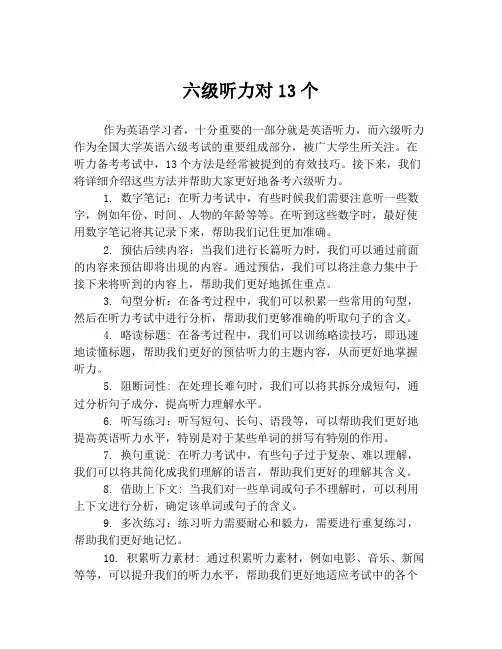
六级听力对13个作为英语学习者,十分重要的一部分就是英语听力,而六级听力作为全国大学英语六级考试的重要组成部分,被广大学生所关注。
在听力备考考试中,13个方法是经常被提到的有效技巧。
接下来,我们将详细介绍这些方法并帮助大家更好地备考六级听力。
1. 数字笔记:在听力考试中,有些时候我们需要注意听一些数字,例如年份、时间、人物的年龄等等。
在听到这些数字时,最好使用数字笔记将其记录下来,帮助我们记住更加准确。
2. 预估后续内容:当我们进行长篇听力时,我们可以通过前面的内容来预估即将出现的内容。
通过预估,我们可以将注意力集中于接下来将听到的内容上,帮助我们更好地抓住重点。
3. 句型分析:在备考过程中,我们可以积累一些常用的句型,然后在听力考试中进行分析,帮助我们更够准确的听取句子的含义。
4. 略读标题: 在备考过程中,我们可以训练略读技巧,即迅速地读懂标题,帮助我们更好的预估听力的主题内容,从而更好地掌握听力。
5. 阻断词性: 在处理长难句时,我们可以将其拆分成短句,通过分析句子成分,提高听力理解水平。
6. 听写练习:听写短句、长句、语段等,可以帮助我们更好地提高英语听力水平,特别是对于某些单词的拼写有特别的作用。
7. 换句重说: 在听力考试中,有些句子过于复杂、难以理解,我们可以将其简化成我们理解的语言,帮助我们更好的理解其含义。
8. 借助上下文: 当我们对一些单词或句子不理解时,可以利用上下文进行分析,确定该单词或句子的含义。
9. 多次练习:练习听力需要耐心和毅力,需要进行重复练习,帮助我们更好地记忆。
10. 积累听力素材: 通过积累听力素材,例如电影、音乐、新闻等等,可以提升我们的听力水平,帮助我们更好地适应考试中的各个题型。
11. 培养语感:通过多说、多听、多读英语,我们可以培养语感,让我们更容易理解英语听力。
12. 备考过程中轻松的心态:英语六级听力考试是一项艰巨的考试,但我们需要保持轻松的心态,尽可能的放松自己,保持良好的心态。
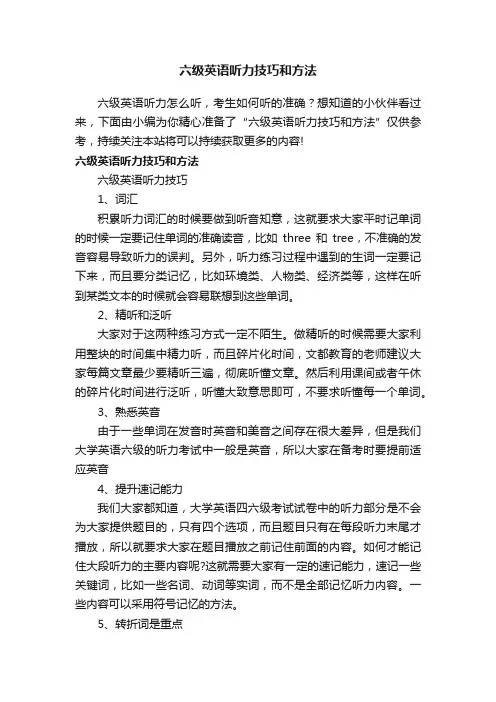
六级英语听力技巧和方法六级英语听力怎么听,考生如何听的准确?想知道的小伙伴看过来,下面由小编为你精心准备了“六级英语听力技巧和方法”仅供参考,持续关注本站将可以持续获取更多的内容!六级英语听力技巧和方法六级英语听力技巧1、词汇积累听力词汇的时候要做到听音知意,这就要求大家平时记单词的时候一定要记住单词的准确读音,比如three和tree,不准确的发音容易导致听力的误判。
另外,听力练习过程中遇到的生词一定要记下来,而且要分类记忆,比如环境类、人物类、经济类等,这样在听到某类文本的时候就会容易联想到这些单词。
2、精听和泛听大家对于这两种练习方式一定不陌生。
做精听的时候需要大家利用整块的时间集中精力听,而且碎片化时间,文都教育的老师建议大家每篇文章最少要精听三遍,彻底听懂文章。
然后利用课间或者午休的碎片化时间进行泛听,听懂大致意思即可,不要求听懂每一个单词。
3、熟悉英音由于一些单词在发音时英音和美音之间存在很大差异,但是我们大学英语六级的听力考试中一般是英音,所以大家在备考时要提前适应英音4、提升速记能力我们大家都知道,大学英语四六级考试试卷中的听力部分是不会为大家提供题目的,只有四个选项,而且题目只有在每段听力末尾才播放,所以就要求大家在题目播放之前记住前面的内容。
如何才能记住大段听力的主要内容呢?这就需要大家有一定的速记能力,速记一些关键词,比如一些名词、动词等实词,而不是全部记忆听力内容。
一些内容可以采用符号记忆的方法。
5、转折词是重点在很多听力内容中,前面的部分会铺垫大段的内容,而关键信息往往通过转折的方式引出来,因此需要大家掌握一些转折连词,比如but、however、nevertheless等。
六级英语听力注意事项1、听音之前的准备要有效利用题目选项进行预判断,包括推测题目内容和考查内容。
在看选项时,要做到以下三点。
一是竖看,确定相同之处。
二是横看,确定不同之处。
三是找出重复性高的词,这些词一般是与主题相关的词,具有路标的功能。
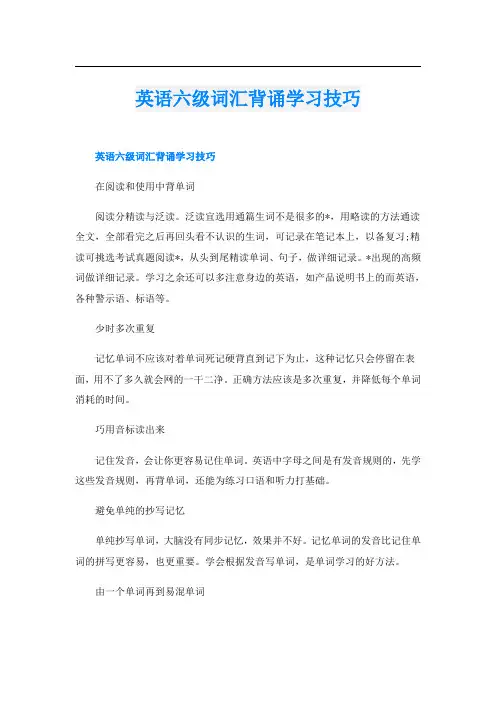
英语六级词汇背诵学习技巧英语六级词汇背诵学习技巧在阅读和使用中背单词阅读分精读与泛读。
泛读宜选用通篇生词不是很多的*,用略读的方法通读全文,全部看完之后再回头看不认识的生词,可记录在笔记本上,以备复习;精读可挑选考试真题阅读*,从头到尾精读单词、句子,做详细记录。
*出现的高频词做详细记录。
学习之余还可以多注意身边的英语,如产品说明书上的而英语,各种警示语、标语等。
少时多次重复记忆单词不应该对着单词死记硬背直到记下为止,这种记忆只会停留在表面,用不了多久就会网的一干二净。
正确方法应该是多次重复,并降低每个单词消耗的时间。
巧用音标读出来记住发音,会让你更容易记住单词。
英语中字母之间是有发音规则的,先学这些发音规则,再背单词,还能为练习口语和听力打基础。
避免单纯的抄写记忆单纯抄写单词,大脑没有同步记忆,效果并不好。
记忆单词的发音比记住单词的拼写更容易,也更重要。
学会根据发音写单词,是单词学习的好方法。
由一个单词再到易混单词大量背单词时有许多易混单词,难以区分。
可以先熟悉其中一个单词,对这个单词掌握得差不多了,再去背与之对应的易混单词。
从常用搭配中记单词有些词经常以词组的形式出现,记住常用搭配,可能会让你更容易记忆单词,而且印象也更深刻。
同时记住的常用搭配在翻译和写作中也经常会用到,一举两得。
巧用记忆曲线尽量在记忆衰减前对已看过的单词进行重复,强化它们在大脑中的印象,10-15天正好是记忆衰减的周期。
可以按照需要记忆的单词总量进行划分,得到每天要看的单词量。
零散时间多记忆每天花数小时背单词的方法效果并不好,长时间枯燥记忆易造成催眠效应。
利用零散时间背单词,如5-10分钟的时间段来替代整块时间,能提高学习效率。
随身携带小卡片、单词复习本在起床十分钟、饭前十分钟、睡前十分钟等零散时间记忆。
不但效率高,还能在不同时段巩固记忆。
英语六级词汇objective目标;客观的participate 参加,参与premium 奖品,奖金;额外津贴;高价的,优质的preserve 保护;保持;腌渍privilege 特权,特许;荣幸prompt 促进,激起;迅速的purchase 购买;购买的物品reflect 反射;反省,细想reject 拒绝;丢弃scan 细看,审视;浏览;扫描shift 移动;转嫁,转给;轮班,换班shortage 不足,缺少source 源(泉),源头;****,出处(= origin)stuff 原料;填满;让…吃饱submit 呈送,提交;主张,建议;服从,屈服superior 卓越的,优良的;较…多的,优于;地位(或级别)较高的;上级,长官temper 脾气,情绪testify证实;说明threaten 威胁,恐吓;预示(某事)transform 使改变,使转化,使变化trend 趋势,倾向unique 唯一的;极不寻常的abandon 抛弃;放弃;放纵,纵情abundant 充分的,充裕的,丰富的accommodate 向…提供住处(或膳食);容纳,收容;顺应,适应accustom 使习惯acknowledge 承认…的权威(或主张);告知(信件、礼物等)已收到,确认;对(礼物)表示感谢acquire 取得,获得;学到aggressive 侵略的,好斗的;[褒]有进取心的alien 外国的;不相容的;(from) 相异的,陌生的;外侨,外来者;外星人英语六级词汇大全transcend 超出,超越(经验、理性、信念等的)范围transient 短暂的,转瞬即逝的transit 运输,载运transmit 传播,发射;传导,传递ultimate 最后的,最终的;根本的;终极,顶点,极限underlying 在下面的;含蓄的,潜在的unify 使联合,统一;使一致unveil 除去…的面纱(盖布)等,揭开;为…揭幕汇总:20__年6月大学英语六级高频词汇大全activate 使活动,启动;激活,使活化administer 掌管,管理;实施,执行;给予,用(药)advanced 先进的,高级的,前进的advisable 可取的,明智的affection [广义]影响;[狭义]爱,慈爱,感情affiliate 使隶属(或附属)于;附属机构,分公司afflict 使身体(或精神)痛苦,折磨aggravate 使加重,使恶化,加剧aid 帮助,援助,救助(first aid 急救)allergic (to)过敏(性)的allocate 分配,分派,把…拨给allowance 津贴,补助(费),零花钱;体谅,考虑ally 同盟国;同盟者,支持者;(with)(使)与…结盟,(使)联合alternate 交替,轮流;交替的,轮流的;间隔的alternative 可供选择的事物,替换物;取舍,抉择;二者择一的ample 充分的,富裕的(←→ scanty);宽敞的,宽大的analyze/-yse 分析,分解;细查,细察anniversary 周年(纪念日)anonymous 匿名的;无名的;无特色的apartment (BrE)房间,套间;(AmE)公寓arrest 逮捕,扣留artificial 人工的,人造的;[喻]矫揉造作的,人为的assault (on)攻击,袭击assemble (人)集合,集会;(物)装配,组装assign 分配,委派assure 使确信,使放心;保证,担保authorize 授权,认可,批准avert 转移(目光、注意力等);避免,防止bachelor [亦作B-]学士(学位) [Master 硕士(学位);Doctor 博士(学位)];单身汉bankrupt 破产的;彻底缺乏的;使破产;破产者urban 城市的urge 催促,力劝;鼓励,促进;强烈希望;强烈欲望utmost 极度的,极端的;极限,极度,最大可能utter 彻底的,完全的;发出(声音),说vary (with)(随…而)变化,改变;改变,使多样化verge 边,边缘;接近,濒临version 型,版本;译本,译文;说法,看法vessel 船,舰;容器,器皿;管,血管volume 卷,册;容积,体积,容量;音量,响度voluntary 自愿的,志愿的(←→ compulsory)vow 誓言,誓约;立誓,起誓vulnerable 易受伤的,脆弱的;易受攻击的,难防御的whereas 而,却,反之withdraw (withdrew; withdrawn)收回,撤销;缩回,退出abnormal 反常的,不正常的abort (使)中止,(使)夭折;(使)流产,堕胎abundance 丰富,充裕academy 学院,研究会accompany 陪伴,伴随;为…伴奏;和…一起发生accordance 一致,和谐accuse控告;谴责,指责acquaint 使了解;使认识大学英语六级单词背诵技巧一、串联记忆首先,什么叫串联记忆呢?简单点说就是通过一个单词,拓展出去,找到相应的同义词和反义词,从而记住一长串词汇。
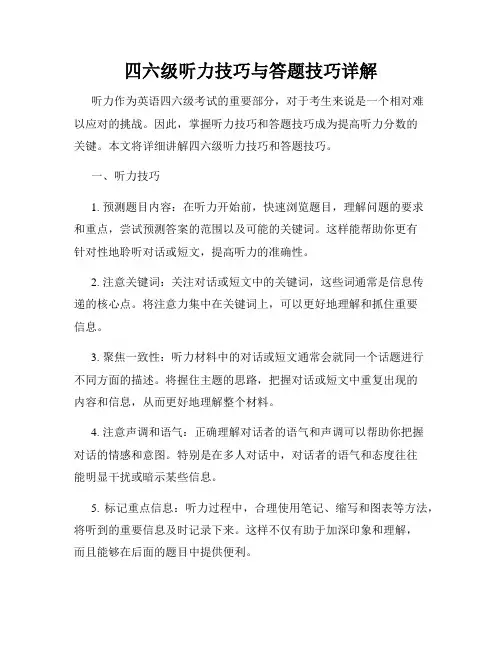
四六级听力技巧与答题技巧详解听力作为英语四六级考试的重要部分,对于考生来说是一个相对难以应对的挑战。
因此,掌握听力技巧和答题技巧成为提高听力分数的关键。
本文将详细讲解四六级听力技巧和答题技巧。
一、听力技巧1. 预测题目内容:在听力开始前,快速浏览题目,理解问题的要求和重点,尝试预测答案的范围以及可能的关键词。
这样能帮助你更有针对性地聆听对话或短文,提高听力的准确性。
2. 注意关键词:关注对话或短文中的关键词,这些词通常是信息传递的核心点。
将注意力集中在关键词上,可以更好地理解和抓住重要信息。
3. 聚焦一致性:听力材料中的对话或短文通常会就同一个话题进行不同方面的描述。
将握住主题的思路,把握对话或短文中重复出现的内容和信息,从而更好地理解整个材料。
4. 注意声调和语气:正确理解对话者的语气和声调可以帮助你把握对话的情感和意图。
特别是在多人对话中,对话者的语气和态度往往能明显干扰或暗示某些信息。
5. 标记重点信息:听力过程中,合理使用笔记、缩写和图表等方法,将听到的重要信息及时记录下来。
这样不仅有助于加深印象和理解,而且能够在后面的题目中提供便利。
二、答题技巧1. 利用选项消减法:在选择题中,单选和多选题通常提供几个选项。
利用所学的听力技巧,将不符合条件的选项逐一排除,最终选出正确答案。
这样可以提高选择题的答题准确性。
2. 注意选项词序:很多听力选项的干扰性在于选项词的词序和原文不一致。
在做题过程中,注意选项词的变化和顺序,避免由于这种干扰导致选项选择错误。
3. 捕捉细节信息:许多听力题目要求考生拾取细节信息。
在听力过程中,注意捕捉细节信息的同时,确保不丢失整体大意。
4. 注意时间提示:听力材料中经常会提到具体的时间信息,例如日期、时间段等。
捕捉这些信息并在答题时有效利用,有助于提高答题的准确度。
5. 学会揣测答案:有时候,无法听清或者无法确定答案的情况下,可以学会根据前后文的逻辑关系和常识进行揣测。
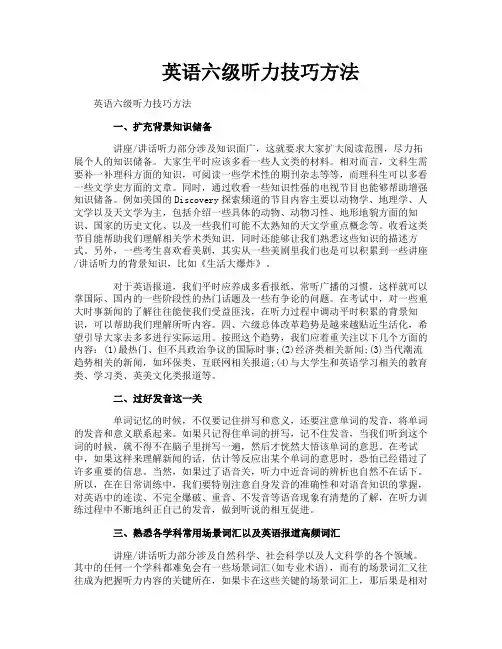
英语六级听力技巧方法英语六级听力技巧方法一、扩充背景知识储备讲座/讲话听力部分涉及知识面广,这就要求大家扩大阅读范围,尽力拓展个人的知识储备。
大家生平时应该多看一些人文类的材料。
相对而言,文科生需要补一补理科方面的知识,可阅读一些学术性的期刊杂志等等,而理科生可以多看一些文学史方面的文章。
同时,通过收看一些知识性强的电视节目也能够帮助增强知识储备。
例如美国的Discovery探索频道的节目内容主要以动物学、地理学、人文学以及天文学为主,包括介绍一些具体的动物、动物习性、地形地貌方面的知识、国家的历史文化、以及一些我们可能不太熟知的天文学重点概念等。
收看这类节目能帮助我们理解相关学术类知识,同时还能够让我们熟悉这些知识的描述方式。
另外,一些考生喜欢看美剧,其实从一些美剧里我们也是可以积累到一些讲座/讲话听力的背景知识,比如《生活大爆炸》。
对于英语报道,我们平时应养成多看报纸,常听广播的习惯,这样就可以掌国际、国内的一些阶段性的热门话题及一些有争论的问题。
在考试中,对一些重大时事新闻的了解往往能使我们受益匪浅,在听力过程中调动平时积累的背景知识,可以帮助我们理解所听内容。
四、六级总体改革趋势是越来越贴近生活化,希望引导大家去多多进行实际运用。
按照这个趋势,我们应着重关注以下几个方面的内容:(1)最热门、但不具政治争议的国际时事;(2)经济类相关新闻;(3)当代潮流趋势相关的新闻,如环保类、互联网相关报道;(4)与大学生和英语学习相关的教育类、学习类、英美文化类报道等。
二、过好发音这一关单词记忆的时候,不仅要记住拼写和意义,还要注意单词的发音,将单词的发音和意义联系起来。
如果只记得住单词的拼写,记不住发音,当我们听到这个词的时候,就不得不在脑子里拼写一遍,然后才恍然大悟该单词的意思。
在考试中,如果这样来理解新闻的话,估计等反应出某个单词的意思时,恐怕已经错过了许多重要的信息。
当然,如果过了语音关,听力中近音词的辨析也自然不在话下。
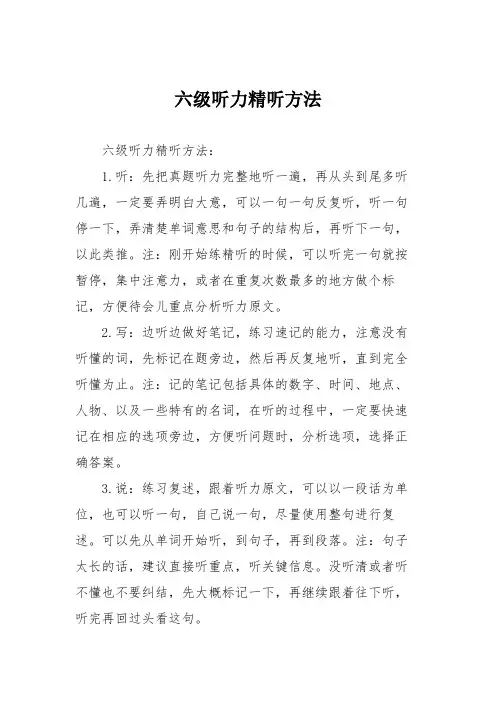
六级听力精听方法六级听力精听方法:1.听:先把真题听力完整地听一遍,再从头到尾多听几遍,一定要弄明白大意,可以一句一句反复听,听一句停一下,弄清楚单词意思和句子的结构后,再听下一句,以此类推。
注:刚开始练精听的时候,可以听完一句就按暂停,集中注意力,或者在重复次数最多的地方做个标记,方便待会儿重点分析听力原文。
2.写:边听边做好笔记,练习速记的能力,注意没有听懂的词,先标记在题旁边,然后再反复地听,直到完全听懂为止。
注:记的笔记包括具体的数字、时间、地点、人物、以及一些特有的名词,在听的过程中,一定要快速记在相应的选项旁边,方便听问题时,分析选项,选择正确答案。
3.说:练习复述,跟着听力原文,可以以一段话为单位,也可以听一句,自己说一句,尽量使用整句进行复述。
可以先从单词开始听,到句子,再到段落。
注:句子太长的话,建议直接听重点,听关键信息。
没听清或者听不懂也不要纠结,先大概标记一下,再继续跟着往下听,听完再回过头看这句。
4.裸听:尝试着不看听力原文,跟读录音,不停顿,按照正常播放的速度,熟悉英语发音及语速。
注:一定要精听完真题听力后,再看着建议跟读、模仿,大声朗读出来,不要怕说错,注意听语音中一些弱读、连读等现象,可以学会模仿,掌握听音规律。
提醒:1.平时做完真题之后,听力一定要回来多听几遍,直到听懂为止。
2.听力开始之前,你可以先把听力选项过一遍,标一下重点的词,这样听的时候可以很快跟上情境。
3.不要根据常识盲目选择答案,一定要听到最后,注意听清问题在问什么。
4.听力期间一定要集中精神,听完一道题后,直接在答题卡上画上结果,不管对错,都不要再想了,立马跟上后面的题。
5.听过后要总结,错误的地方反复听,听混淆的词好好记,直到所有听力内容无障碍能理解。

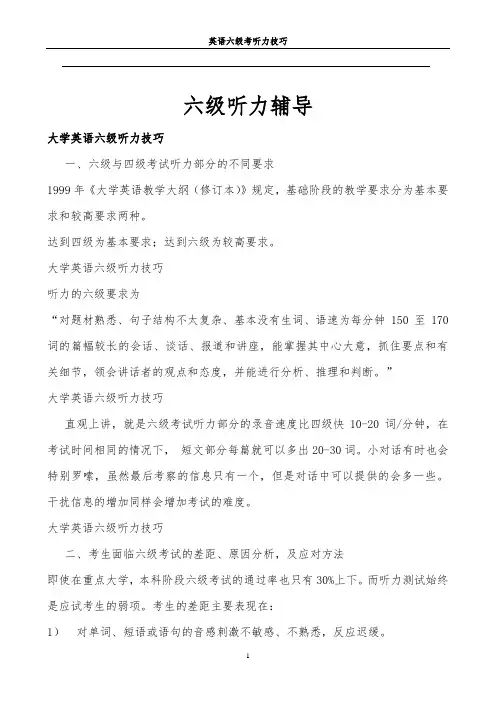
六级听力辅导大学英语六级听力技巧一、六级与四级考试听力部分的不同要求1999年《大学英语教学大纲(修订本)》规定,基础阶段的教学要求分为基本要求和较高要求两种。
达到四级为基本要求;达到六级为较高要求。
大学英语六级听力技巧听力的六级要求为“对题材熟悉、句子结构不太复杂、基本没有生词、语速为每分钟150至170词的篇幅较长的会话、谈话、报道和讲座,能掌握其中心大意,抓住要点和有关细节,领会讲话者的观点和态度,并能进行分析、推理和判断。
”大学英语六级听力技巧直观上讲,就是六级考试听力部分的录音速度比四级快10-20词/分钟,在考试时间相同的情况下,短文部分每篇就可以多出20-30词。
小对话有时也会特别罗嗦,虽然最后考察的信息只有一个,但是对话中可以提供的会多一些。
干扰信息的增加同样会增加考试的难度。
大学英语六级听力技巧二、考生面临六级考试的差距、原因分析,及应对方法即使在重点大学,本科阶段六级考试的通过率也只有30%上下。
而听力测试始终是应试考生的弱项。
考生的差距主要表现在:1)对单词、短语或语句的音感刺激不敏感、不熟悉,反应迟缓。
大学英语六级听力技巧原因在于很多考生是出于应付考试而不是掌握一门语言的动机去学习英语。
除了认识一些单词之外,对作为一们语言的英语是既听不懂也说不出,听英文对话或者段落时是一个词一个词那么去听,熟悉程度远远达不到正常交流的要求,而六级考试的听力部分的语速已经接近于正常语速。
大学英语六级听力技巧考生需要加强的就是语言能力的应用,多听,多写,多说,在学习语言的过程中更多的着眼于应用而不是应考,在学习材料的选择上侧重于段落文章而不是单纯去背单词或者字典。
另外一些学校的图书馆会定期播放一些中文字幕的原版电影,这些材料对英语语言的学习,尤其是听力能力的提高,是相当有帮助的。
近年来六级考试的内容越来越贴近现实,部分题目要求对英美国家的生活习俗有一定了解才可以正确回答,例如:大学英语六级听力技巧A) Painting a picture.B) Hosting a program.C) Designing a studio.D) Taking a photograph.大学英语六级听力技巧W: Well, tonight we have Professor Brown in the studio to talk about his recent book Fashion Images. Good evening, professor.M: Good evening, and thank you for inviting me here this evening.Q: What is the woman doing?大学英语六级听力技巧(答案为B,CET_6 2002年6月第3题)就这类题目来讲,单纯依靠课本或者听力课程中的知识是很难解答的,因为studio本身也是个多义词:可以是创作室,可以是摄影棚或者录音室,也可以是演播室;而如果接触过一些英文的广播或者电视节目,这类题目就很容易解决了。
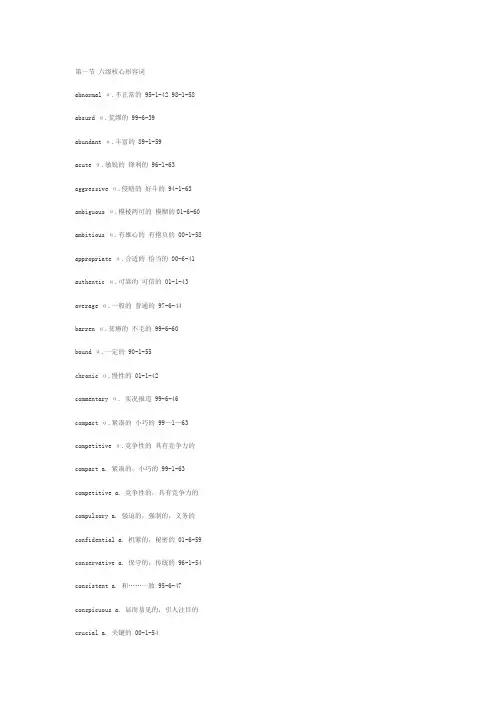
第一节六级核心形容词abnormal α.不正常的 95-1-42 98-1-58 absurd α.荒缪的 99-6-39abundant α.丰富的 89-1-59acute α.敏锐的锋利的 96-1-63 aggressive α.侵略的好斗的 94-1-63 ambiguous α.模棱两可的模糊的01-6-60 ambitious α.有雄心的有抱负的 00-1-58 appropriate α.合适的恰当的 00-6-41 authentic α.可靠的可信的 01-1-43 average α.一般的普通的 97-6-44 barren α.贫瘠的不毛的 99-6-60bound α.一定的 90-1-55chronic α.慢性的 01-1-42commentary α. 实况报道 99-6-46 compact α.紧凑的小巧的 99—1—63 competitive α.竞争性的具有竞争力的compact a. 紧凑的,小巧的 99-1-63 competitive a. 竞争性的,具有竞争力的compulsory a. 强迫的,强制的,义务的confidential a. 机紧的,秘密的 01-6-59 conservative a. 保守的,传统的 96-1-54 consistent a. 和……一致 95-6-47 conspicuous a. 显而易见的,引人注目的crucial a. 关键的 00-1-54current a. 当前的 93-1-70current a. 当前的 89-1-69decent a. 体面的,像样的,还不错的 00-1-67 delicate a. 精细的,微妙的,精心处理的destructive a. 毁灭的 01-1-46economic a. 经济的 93-6-59elegant a. 优雅的,优美的,精致的 96-6-42 embarrassing a. 令人尴尬的 93-6-61 energetic a. 精力充沛的 98-1-59equivalent a. 相等的 91-6-46eternal a. 永恒的,无休止的 00-6-45 exclusive a. 独有的,排他的 97-1-60extinct a. 灭绝的 01-1-40extinct a. 灭绝的,绝种的 99-6-40fatal a. 假的,冒充的 98-1-56fatal a. 致命的,毁灭性的 96-6-62feasible a. 可行的 00-1-42feeble a. 脆弱的,虚弱的 99-1-60rough a. 粗略的,不精确的 97-6-41rude a. 粗鲁的,不礼貌的 89-1-55sensitive a. 敏感的 98-1-60sheer a. 完全的,十足的 97-6-42 98-6-57 shrewd a. 精明的 99-6-45stationary a. 固定的 97-6-46subordinate a. 次要的,从属的 97-1-70subtle a. 微妙的,精巧的,细微的 98-6-65superficial a. 肤浅的 93-6-63suspicious a. 对……怀疑 96-1-70 gloomy a. 暗淡的 01-4-48 greasy a. 油腻的 00-1-56identical a. 相同的,一样的 95-1-64 01-6-67imaginative a. 富有想象力的,爱想象的inaccessible a. 可接近的,易使用的 96-1-43inadequate a. 不充分的,不适当的 99-1-44incredible a. 难以置信的96-6-53 98-1-68indifference a. 不关心的,冷漠的 96-6-67indignant a. 生气的,愤怒的 00-6-43infectious a. 传染的,传染性的 95-1-62inferior a. 较次的,较劣的 91-6-57inferior a. 地位较低的,较差的 96-1-48inherent a. 固有的,生来的 96-6-59inspirational a. 灵感的 01-1-44intent a. 专心的,专注的 97-6-43intricate a. 复杂精细的 00-1-55intrinsic a. 固有的,本质的,内在的 99-1-62irreplaceable a. 不能替换的,不能代替的literal a. 文字的,字面的,逐字逐句的massive a. 大规模的,大量的 00-6-42merciful a. 仁慈的,宽大的 97-1-51mobile a. 活动的,流动的 93-6-54naive a. 言行自然而天真的,质朴的 98-6-68negligible a. 可忽略的,微不足道的 00-1-57 notorious a. 臭名昭著的,声名狼藉的obedient a. 服从的,顺从的 01-1-47obscure a. 模糊不清的 00-1-66 97-1-61 optimistic a. 乐观的 99-6-44original a. 原先的,最早的 98-1-62pathetic a. 悲哀的,悲惨的 98-6-47 persistent a. 坚持不懈的 89-1-60potential a. 可能的,潜在的 98-1-61 prevalent a. 普遍的,流行的 99-6-43 primitive a. 原始的,早期的 01-1-60 proficient a. 熟练的,精通的 99-1-59 profound a. 深刻的,深远的 93-6-52 prominent a. 突出的,杰出的 96-6-66 98-1-57 prompt a. 即刻的,迅速的 90-1-46raw a. 自然状态的,未加工的 93-1-46 relevant a. 与……有关的 93-6-51 respectable a. 可尊敬的 00-1-43 01-1-39 rewarding a. 值得的 95-1-48tedious a. 冗长的,乏味的 94-1-67 95-1-54 trivial a. 琐碎的,不重要的99-6-38 00-1-59 turbulent a. 动荡的,混乱的 00-6-44 underlying a. 潜在的 99-6-42versatile a. 多才多艺的 97-1-41vivid a. 生动的,栩栩如生的 95-6-62void a. 无效的 99-1-66vulnerable a. 易受伤的 01-1-45worth a. 值得 97-1-67第二节六级核心副词deliberately ad. 故意,有意地 91-6-48 deliberately ad. 深思熟虑地,审慎地 97-1-50 exclusively ad. 仅仅地 99-1-70explicitly ad. 明确地 01-6-64forcibly ad. 强行地,有力地 01-6-63 formerly ad. 原先地,以前,从前 96-1-57 increasingly ad. 日益,越来越多地 01-6-68 inevitably ad. 必然地,不可避免地 97-1-57 intentionally ad. 有意地,故意地 98-1-63 optimistically ad. 乐观地 00-6-46outwardly ad. 表面上,外表上地 95-1-65 presumably ad. 大概,可能,据推测 99-1-64 simultaneously ad. 同时发生地00-6-47 somewhat ad. 颇为,稍稍,有几分 96-1-59 spontaneously ad. 自发地,自然产生地startlingly ad. 惊人地 97-6-66triumphantly ad. (欣喜)胜利地,成功地unexpectedly ad. 意外地 89-1-70 93-1-68 virtually ad. 事实上,实际地 95-1-45第三节六级核心名词access n. 入口,通路,接触 97-1-47 accommodation n. 住宿,膳宿 94-1-47 acknowledgement n. 承认,感谢,致谢admiration n. 欣赏 94-1-52 advocate n. 提倡者,拥护者 97-1-42 allowance n. 津贴 93-6-50ambition n. 野心,雄心 01-1-33 analogy n. 相似,模拟,类比 01-6-46 anticipation n. 预期,期望 93-1-44 appreciation n. 感谢,感激 97-1-68 array n. 陈列,一系列 99-6-52 assurance n. 保证 01-1-34blame n. 责任 91-6-55blunder n. 错误,大错 99-1-51 budget n. 预算 97-1-52 98-1-54 capability n. 能力,才能 96-6-61 cash n. 现金 90-1-48expenditure n. 开支 00-6-49 extinction n .灭绝 00-1-70fashion n. 方式,样子 00-1-61flaw n. 裂纹,瑕疵 97-6-50fortune n. 财产,大笔的钱 93-1-64 fraction n. 小部分,一点 98-6-61 fuse n. 保险丝 90-1-65guarantee n. 保修单 93-6-69guilt n. 犯罪 96-1-67harmony n. 与……协调一致,和谐 98-1-51 hospitality n. 友好款待,好客 99-6-49 humor n. 情绪,心境 93-1-49illusion n. 错觉,假象 01-1-38 ingredient n. 成分 01-1-36insight n. 理解,洞察力 93-1-61 99-1-57 inspection n. 检查,视察 98-6-55 instinct n. 本能,直觉 95-6-60integrity n. 正直,诚实 99-1-53intuition n. 直觉 00-1-60intuition n. 直觉 99-1-56lease n. 租约,契约 00-6-53legislation n. 立法,法律 01-6-70 limitation n. 局限性,缺点 91-6-60 loyalty n. 忠诚,忠心 95-6-70luxury n. 奢侈,豪华 98-1-55 manifestation n. 表现(形式) 97-6-69 mechanism n. 机械装置 00-6-55minority n. 少数 97-6-53misfortune n. 不幸,灾难 96-1-51 morality n. 道德,美德 96-6-43notion n. 概念,观念,理解 98-6-60 obligation n (法律上或道义上的)责任occasion n. 场合 89-1-56opponent n. 敌人,对手 95-1-46ornament n. 装饰,装饰品 01-1-35 participation n. 参加,加入 00-1-63 pastime n. 消遣,娱乐 98-6-49pattern n. 模式 97-6-47penalty n. 制裁,惩罚 98-1-52 99-1-50 pension n. 养老金 00-6-54personality n. 人格,人性 96-6-52 circulation n. (书报等的)发行量 97-6-70 commitment n. 承诺,许诺 99-6-58 compensation n. 补偿,赔偿 97-6-48 consideration n. 考虑 93-1-59constitution n. 组成,构成 00-6-50 consultant n. 顾问 00-6-52controversy n. 争论,辩论 01-1-32damage n. 损坏 95-1-60debate n. 争论,辩论 97-1-53denial n. 否认,否定,拒绝给与(正义,权利) digest n. 摘要,简编 97-6-51dilemma n. 窘境,困境 00-1-62distinction n. 区分,辨别 99-6-53 emergency n. 紧急情况 93-6-42 encouragement n. 鼓励 90-1-69 98-6-43 essence n. 本质 01-1-41pledge n. 保证,誓言 99-6-48position n. 位置,职位,职务 95-6-59 predecessor n. 前任,原有的事物 01-6-44 premise n. 前提,假设 01-1-31prescription n. 处方 98-1-49 01-6-41 preservation n. 保护,防护 95-1-53 prestige n. 威信,威望 99-6-50priority n. 优先(权) 96-6-48prospect n. 前景,可能性 89-1-62rate n. 速度 95-1-66ration n. 比率 90-1-57recession n. (经济)衰退,不景气;撤退,退出reflection n. 反映,表现 98-6-51 99-6-51 reputation n. 名声,声望 94-1-42 reservation n. 贮存,贮藏 98-6-67 reservation n. 预订 99-1-43revenue n. 税收,岁入 99-1-58rival n. 竞争对手 96-1-56routine n. 常规,惯例,例行公事 90-1-47 scene n. 景色,景象 99-1-67scorn n. 轻蔑,鄙视 89-1-61shortage n. 短缺,不足 91-6-49smash n. 打碎,粉碎 96-6-54stability n. 稳定(性),稳固 96-1-62standard n. 标准 89-1-47surface n. 表面 96-1-66temperament n. 气质,性格 99-6-47 threshold n. 开端,入口 00-1-64tolerance n. 容忍,忍耐力 98-1-50 transaction n. 处理,办理,交易 98-6-56 transition n. 过渡,转变 01-1-37 01-6-42 trend n. 倾向,趋势 93-6-48variation n. 变化,变动 94-1-61 warehouse n. 货仓 98-6-66way n. 方式 90-1-68第四节六级核心动词abandon v. 抛弃,放弃 93-1-43 acknowledge v. 对……表示谢忱,报偿acquaint v. 熟悉,认识 98-6-64 01-6-48 acquire v. (靠自己的能力、努力或行为)获得,得到 98-6-52afford v. 付得起 98-1-48allege v. 断言,宣称 00-6-61alternate v. 交替,轮流 90-1-51anticipate v. 预期 00-1-41applaud v. 赞扬,称赞 96-1-42ascend v. 上升,攀登 98-6-59ascribe v. 归因于,归功于 00-1-51 assemble v. 集合,聚集 97-6-62assign v. 分派,指派(职务,任务) 90-1-59 attribute v. 归因于 91-6-69 93-1-53base v. 建立在……的基础上 91-6-64bewilder v. 迷惑,弄糊涂 98-6-48 01-6-49 breed v. 培育,养育 98-1-53cling v. 坚守,抱紧 97-1-48coincide v. 相同,相一致 91-6-58 collaborate v. 合著,合作 98-6-54collide v. 互撞,碰撞 97-1-63commence v. 开始 95-1-57 99-1-41 compensate v. 补偿,赔偿 00-6-69 98-1-43 complement v. 与……结合,补充 98-6-46 comply v. 遵守 95-6-57 98-1-44 99-6-32 conceive v. 想出,设想 96-6-56 00-1-52 concern v. 涉及 90-1-60condense v. 压缩,浓缩 97-1-62conflict v. 冲突,战争 99-1-47conform v. 符合,遵守,适应00-6-63 01-1-54 confront v. 面对,面临 96-6-54conserve v. 保护,保存 01-1-58consolidate v. 巩固 99-6-35convey v. 表达,传达 93-6-65 96-6-50crash v. (飞机)坠毁 96-1-50cruise v. 航行,漫游 99-1-48dazzle v. 使眩目,耀眼 01-1-59deceive v. 欺骗,哄骗 96-1-45decline v. 下降,减少 97-6-57dedicate v. 奉献,献身,致力于 98-6-63 defend v. 为……辩护 00-1-65magnify v. 放大 91-6-67mean v. 打算,意欲 93-6-43mingle v. 混合起来,相混合 00-1-53 00-6-62 minimize v. 对……做最低估计 99-1-46 monitor v. 检测,监测 99-6-59neglect v. 忽视 97-6-64occupy v. 占领,使忙碌 98-6-44oppress v. 压迫 00-6-58originate v. 首创,起源 95-6-56overlap v. 部分重叠 00-6-66overwhelm v. 压倒,浸没,使不安 97-1-59 parade v. 游行 95-1-43permeate v. 渗入,渗透 99-1-68prescribe v. 处方,开药 95-6-68preside v. 主持 98-6-69prolong v. 延长,拖延 94-1-59promise v. 许诺 93-6-41propel v. 推进,推动 00-1-46protest v. 抗议,反对 95-1-56provoke v. 引起,激起 00-6-60radiate v. 辐射状发出,从中心向各方伸展出reconcile v. 使和好,调解 95-1-59 99-6-34 refresh v. 提神,使清新 94-1-49refute v. 证明……不对(是错误的),驳诉remain v. 停留,依旧是 94-1-56repel v. 抗御,抵拒 97-6-60defy v. 违抗,藐视 01-1-56deny v. 否认 96-1-41deprive v. 剥夺 97-1-45 00-6-57 01-1-51 derive v. 得来,得到 94-1-62descend v. 下落 91-6-54descend v. 下来,下去 97-1-43deserve v. 值得 93-1-57deviate v. (使)背离,(使)偏离 01-6-54 disguise v. 假扮,伪装 00-1-44dominate v. 统治,占据 00-6-70 96-6-46 drain v. 渐渐耗尽 00-6-56duplicate v. 复制,重复 97-6-59eliminate v. 消除 91-6-70endure v. 忍受,忍耐 94-1-55enhance v. 提高,增加 01-1-53enhance v. 提高 97-6-58enroll v. 使成为……的成员,注册 01-6-47evoke v. 引起,唤起 99-6-31exclaim v. 呼喊,欢呼 94-1-65expire v. 到期,期满 99-6-37explore v. 探险,探索 96-1-65flap v. (鸟)振翅(飞行) 00-6-64follow v. 遵从 93-6-45furnish v. 配备,装饰 97-6-61 01-6-53 gaze v. 凝视,注视 97-1-58gear v. 使适应,使适合 00-6-59grieve v. 使伤心,使悲伤 01-6-55 hamper v. 妨碍,限制 97-6-63 01-1-52 haul v. 拖,拉 00-1-49hinder v. 阻碍,妨害 98-1-41hoist v. 举起,升起,吊起 99-1-61 identify v. 认出,确认 94-1-69 99-1-55 ignite v. 引燃 95-1-67 99-6-36 immerse v. 使浸没 01-6-51impose v. 把……强加于 89-1-57 93-6-67 induce v. 劝诱,诱导 99-1-69indulge v. 纵容,放任 97-1-46intend v. 意欲 94-1-53interpret v. 解释,说明 95-6-55 jeopardize v. 危及,损坏 00-6-65linger v. 逗留,徘徊,留恋;迟缓,拖延locate v. 位于 95-1-50rescue v. 营救,救援 89-1-53resign v. 辞职 93-1-63resort v. 求助,凭借,诉诸 98-6-53 resume v. 重新开始,继续 95-1-70 revenge v. 报仇,报复 00-1-48scan v. 细察,审视 98-1-45scrape v. 剥下,刮下 00-1-50scratch v. 抓,搔 01-1-55shrink v. 收缩,减少 99-1-45 standardize v. 使标准化 95-6-53 99-1-52 steer v. 驾驶,引导 98-1-69strengthen v. 加强,使更强壮 97-1-44 stretch v. 伸展 00-1-47subscribe v. 预订,订阅 01-6-52suck v. (用嘴)吸,吞噬,卷入 98-1-42 suppress v. 镇压 99-6-33sustain v. 承受 91-6-59tackle v. 解决,处理 96-1-53tempt v. 引诱,劝诱 97-1-57tempt v. 引诱,劝诱 98-1-47terminate v. 终止,结束98-6-45 01-6-50 transmit v. 传播,传递 95-6-69verify v. 证实,证明 94-1-46view v. 视为,看做 93-6-53wreck v. (船只)失事 93-6-44。
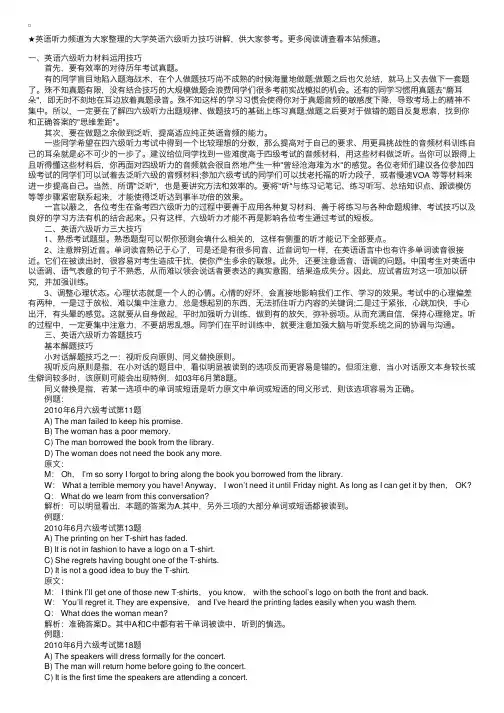
★英语听⼒频道为⼤家整理的⼤学英语六级听⼒技巧讲解,供⼤家参考。
更多阅读请查看本站频道。
⼀、英语六级听⼒材料运⽤技巧 ⾸先,要有效率的对待历年考试真题。
有的同学盲⽬地陷⼊题海战术,在个⼈做题技巧尚不成熟的时候海量地做题;做题之后也⽋总结,就马上⼜去做下⼀套题了。
殊不知真题有限,没有结合技巧的⼤规模做题会浪费同学们很多考前实战模拟的机会。
还有的同学习惯⽤真题去"磨⽿朵",即⽆时不刻地在⽿边放着真题录⾳。
殊不知这样的学习习惯会使得你对于真题⾳频的敏感度下降,导致考场上的精神不集中。
所以,⼀定要在了解四六级听⼒出题规律、做题技巧的基础上练习真题;做题之后要对于做错的题⽬反复思索,找到你和正确答案的"思维差距"。
其次,要在做题之余做到泛听,提⾼适应纯正英语⾳频的能⼒。
⼀些同学希望在四六级听⼒考试中得到⼀个⽐较理想的分数,那么提⾼对于⾃⼰的要求、⽤更具挑战性的⾳频材料训练⾃⼰的⽿朵就是必不可少的⼀步了。
建议给位同学找到⼀些难度⾼于四级考试的⾳频材料,⽤这些材料做泛听。
当你可以跟得上且听得懂这些材料后,你再⾯对四级听⼒的⾳频就会很⾃然地产⽣⼀种"曾经沧海难为⽔"的感觉。
各位⽼师们建议各位参加四级考试的同学们可以试着去泛听六级的⾳频材料;参加六级考试的同学们可以找⽼托福的听⼒段⼦,或者慢速VOA 等等材料来进⼀步提⾼⾃⼰。
当然,所谓"泛听",也是要讲究⽅法和效率的。
要将"听"与练习记笔记、练习听写、总结知识点、跟读模仿等等步骤紧密联系起来,才能使得泛听达到事半功倍的效果。
⼀⾔以蔽之,各位考⽣在备考四六级听⼒的过程中要善于应⽤各种复习材料,善于将练习与各种命题规律、考试技巧以及良好的学习⽅法有机的结合起来。
只有这样,六级听⼒才能不再是影响各位考⽣通过考试的短板。
⼆、英语六级听⼒三⼤技巧 1、熟悉考试题型。
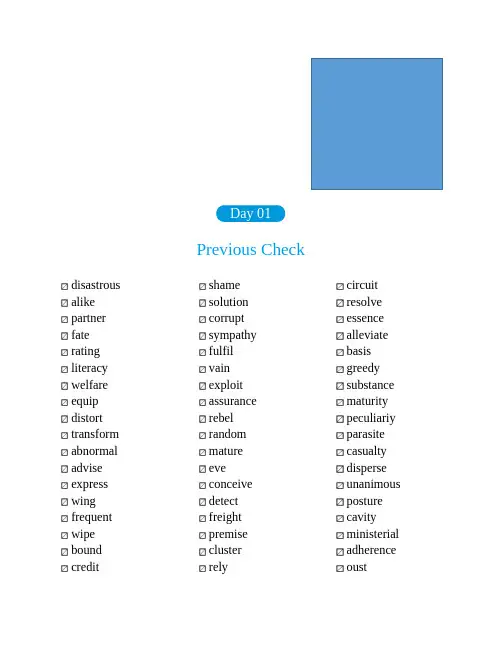
Day 01Previous Checkdisastrous shame circuitalike solution resolvepartner corrupt essencefate sympathy alleviaterating fulfil basisliteracy vain greedywelfare exploit substanceequip assurance maturity distort rebel peculiariytransform random parasiteabnormal mature casualty advise eve disperseexpress conceive unanimouswing detect posturefrequent freight cavitywipe premise ministerial bound cluster adherence credit rely oustrelative deceive transcribestatistics sub stapleapparent famine retrievalassociation strategy gorgedefense cumulative stalkgovern conserve elicitvalley bewilder infinityadmire density slashaccent motivate rejoicecompress register oppressawait preside brokercomplicated recovery dismaywicked spark rupturedischarge adjust ticklecabin reliablecivilian deservedisastrous / dɪˈzɑːstrəs /001释 a. 极糟糕的,灾难性的,完全失败的例We need only look at the examples of Canada, Sweden, Australia or Germany, where Saturday delivery is charged extra, to see the non-disastrous effects of such a policy. 我们只要看看加拿大、瑞典、澳大利亚或德国这几个针对周六递送收取额外费用的例子就会知道,这种政策并不会带来什么灾难性的后果。
英语六级听力四大蒙题技巧CET6技巧推荐很多同学在做听力题的时候经常会由于录音的速度太快,或考场紧张等因素而漏听。
今天学习啦小编在这里为大家分享在英语六级听力考试中猜答案的时候常用的思路,希望对大家能够有所帮助。
>>>点击这里更加精彩“CET6写作万能句型”英语六级听力蒙题技巧一(1)选项中较符合常识的,易明白的一般不是选项;而似乎不太合理,一时较难理解的往往是正确选项。
(2)阅读中的干扰项的补充问题(3)答案项中有绝对语气词的一般不是正确答案项。
这些语气词有: must, always, never, the most, all, only, have to, any, no, very completely, none, hardly等。
(4)选项中含有不十分肯定的语气词一般是正确答案项。
这些语气词有: can, could, may, should, usually, might, most(大多数),more or less, relatively, be likely to, possible, whether or, not necessarily 等。
(5)选项中照抄原文的一般不是答案项,而同义替换的一般是选项(6)选项中表达意义较具体的、肤浅的(字面意思)一般不是答案项,而概括性的、抽象的、含义深刻的是答案项。
英语六级听力蒙题技巧二逻辑推理题干扰项特点:1、不是在文章事实或上下文(句)逻辑基础上进行推理而得出了观点。
2、虽然可以以文章提供的事实或内在逻辑为基础进行推理,但推理过头,概括过度。
英语六级听力蒙题技巧三六级深度阅读准确解答4大步骤(1)浏览题目,推测全文主题阅读理解的五道题目之间通常都会有隐含的逻辑联系,所以通过第一遍的初步浏览,有助于把握文章所谈论的主题,作出简单设想和推测。
(2)判断题型,确定题干关键词六级的深度阅读主要考查主旨题、细节题、猜词题、推论题和态度题等五种题型,重点考查细节题。
超纲单词表abut [əˈbʌt] v. 邻接,毗连【记】联想记忆:a(无)+but(但是)→没有转折→不需要经过绕弯就能直接到达→邻接,毗连accessible [ækˈsesəbl] adj. 易达到的,易受影响的【记】来自access(接近)+ible(易…的)→易接近的→易达到的accusation [ækjuːˈzeiʃən] n. 控告,谴责【记】来自accuse(v. 控告,谴责)advent [ˈædvənt] n. 到来,来临,出现【记】词根记忆:ad(加强)+vent(来)→到来,来临affluent [ˈæfluənt] adj. 富裕的,富足的【记】词根记忆:af(不断)+flu(流)+ent→富得流油→富足的alarmist [əˈlɑːmist] n. 危言耸听的人【记】联想记忆:alarm(警报)+ist→常报警报→危言耸听的人allegiance [əˈliːʤəns] n. 拥护,忠诚【记】词根记忆:al+leg(法律)+iance→法律需要人人拥护analyst [ˈænəlist] n. 分析家,化验员;心理分析学家【记】词根记忆:ana(分开)+lyst→分类研究→分析家announcement [əˈnaunsmənt] n. 宣告,发表【记】来自announce(v. 宣布,通告)antenna [ænˈtenə] n. 触角,触须;天线【记】联想记忆:ant(蚂蚁)+enna→蚂蚁头上长触角appreciable [əˈpriːʃəbl] adj. 可评估的,可以观察到的,明显的【记】词根记忆:ap(加强)+preci(价值)+able→可以给出价值的→可评估的aroma [əˈrəumə] n. 芳香,香气【记】发音记忆:“爱罗马”→《罗马假日》中奥黛丽·赫本如雏菊般芳香四溢→芳香arson [ˈɑːsn] n. 纵火,放火【记】词根记忆:ars(热)+on→纵火,放火aspire [əˈspaiə] vi. (to, after)渴望,追求,有志于【记】词根记忆:a+spir(呼吸)+e→因为太渴望得到而不停地呼吸assessment [əˈsesmənt] n. 估价,评估assessor [əˈsesə] n. 估价员,评税员【记】以上两词均来自assess(v. 估价)astronomer [əˈstrɔnəmə] n. 天文学家【记】联想记忆:astro(星星)+nom(看作nomy,学科)+er(人)→研究星学的人→天文学家audible [ˈɔːdəbl] adj. 听得见的【记】词根记忆:aud(听)+ible(能…的)→能听的→听得见的audit [ˈɔːdit] vt. 审计,检查(账目)【记】词根记忆:aud(听)+it→审计要多听取意见auditorium [ˌɔːdiˈtɔːriəm] n. 观众席,听众席;礼堂【记】词根记忆:audi(听)+torium(地点)→让大家听演讲的地方→大礼堂auditory [ˈɔːditəri] adj. 听觉的,听觉器官的【记】词根记忆:audi(听)+tory→听觉的automated [ˈɔːtəmeitid] adj. 自动化的【记】词根记忆:auto(自动)+mated→自动化的benevolent [biˈnevələnt] adj. 仁慈的,善意的,慈善的【记】词根记忆:bene(好)+vol(意志)+ent→慈善的,助人为乐的benign [biˈnain] adj. 善良的,慈祥的;(肿瘤等)良性的,无危险的【记】词根记忆:ben(好)+ign→好的→良性的betrayal [biˈtreiəl] n. 背叛【记】来自betray(v. 背叛)bloodshed [ˈblʌdʃed] n. 流血;杀戮【记】联想记忆:blood(血)+shed(流出)→血流成河→杀戮brittle [ˈbritl] adj. 易碎的;脆弱的;冷淡的,不友好的;(声音)尖利的budge [bʌʤ] v. 移动【记】联想记忆:bud(芽)+ge→抽芽→轻轻地移动canteen [kænˈtiːn] n. 食堂,小卖部;(带帆布套的)水壶【记】联想记忆:cant(说,唱)+een→战士们背着水壶在食堂唱歌→食堂;水壶capability [ˌkeipəˈbiliti] n. 能力,潜质;容量【记】联想记忆:cap(拿,抓)+ability(能力)→能掌握的能力carcass [ˈkɑːkəs] n. (鸟、兽的)尸体,(宰后除脏去头的)畜体;(人的)身躯,躯壳【记】联想记忆:car(汽车)+cass(看作cast,投掷)→发生车祸,汽车被甩到一边,留下尸体→(动物的)尸体chancellor [ˈtʃɑːnsələ] n. (英国某些大学的)名誉校长,(美国的)大学校长【记】联想记忆:chance(机会,运气)+llor→他当上大学校长全凭运气→大学校长clinical [ˈklinikəl] adj. 临床的collaborate [kəˈlæbəreit] v. 合作,协作;通敌【记】词根记忆:col(共同)+labor(劳动)+ate→共同劳动→合作,协作combustion [kəmˈbʌstʃən] n. 燃烧【记】联想记忆:com(共同)+bus(汽车)+tion→火灾中数辆消防车齐上阵→燃烧compactness [kəmˈpæktnis] n. 紧密;简洁【记】词根记忆:com(共同)+pact(压紧)+ness→一起压紧→紧密compassion [kəmˈpæʃən] n. 同情,怜悯【记】联想记忆:com(共同)+passion(感情)→同情comprehend [ˌkɔmpriˈhend] v. 理解,领会【记】词根记忆:com(全部)+prehend(抓住)→全部抓住→理解,包括condemnation [ˌkɔndemˈneiʃən] n. 谴责【记】来自condemn(v. 谴责)confession [kənˈfeʃən] n. 供认,坦白,忏悔【记】来自confess(v. 承认,坦白)confinement [kənˈfainmənt] n. 限制,禁闭【记】来自confine(v. 限制,禁闭)contamination [kənˌtæmiˈneiʃon] n. 污染,玷污【记】联想记忆:conta(看作contra,反对)+min(最小)+ation→污染再小,我们也要反对,所谓“勿以恶小而为之,勿以善小而不为”contributor [kənˈtribjutə] n. 贡献者,捐助者;投稿者【记】词根记忆:con(共同)+tribut(付,赠予)+or(人)→贡献者converse [ˈkɔnvəːs] n. [the~]相反的事物,反面说法[kənˈvəːs] vi. 交谈,谈心【记】词根记忆:con(共同)+vers(改变)+e→共同讨论,互有改变→交谈correlation [ˌkɔrəˈleiʃən] n. 相互关系【记】词根记忆:cor(共同)+relation(关系)→相互关系cosmonaut [ˈkɔzmənɔːt] n. 宇航员cosmopolitan [ˌkɔzməˈpɔlitən] n. 世界主义者,四海为家的人adj. 世界性的,全球的;世界主义的,四海为家的【记】联想记忆:cosmo(世界,宇宙)+poli(看作polis,城市)+tan→世界城的→世界性的coup [kuː] n. 政变,意外而成功的行为【记】联想记忆:摔杯(cup)为号发动政变(coup);发音记忆:“酷”→这次意外而成功的行为好酷啊!credentials [kriˈdenʃəlz] n. 证明,资格;证明书,证件【记】词根记忆:cred(相信)+entials→让人相信的东西→证明书cult [kʌlt] n. 异教,邪教;时尚,狂热的崇拜【记】联想记忆:culture(文化)去掉ure→没文化→搞狂热的献身或崇拜curt [kəːt] adj. 简短的,草率的,简单粗暴的【记】联想记忆:cut(切)+r→把r一刀切了→简短的,草率的cyberspace [ˈsaibəspeis] n. 虚拟信息空间,网络空间,计算机世界【记】组合词:cyber(计算机)+space(空间)→计算机世界,网络空间dealer [ˈdiːlə] n. 商人;发牌者【记】deal(交易)+er(人)→交易的人→商人deceptive [diˈseptiv] adj. 骗人的,造成假象的;靠不住的【记】词根记忆:de(去掉)+cept(取)+ive→不可取的→骗人的,靠不住的decode [ˌdiːˈkəud] vt. 译(码),解(码)【记】词根记忆:de(去掉)+code(密码)→解除密码→译(码),解(码)deed [diːd] n. (土地或建筑物的)转让契约,证书defective [diˈfektiv] adj. 有缺点的,不完美的,不完全的【记】词根记忆:de+fect(做)+ive→做得不完美也胜过什么都不做deficient [diˈfiʃənt] adj. 缺乏的,不充足;不适当【记】词根记忆:de(变坏)+fic(做)+ient→做得不好的→缺乏的,不充足,不适当demonstration [ˌdemənˈstreiʃən] n. 论证,证实;示威【记】词根记忆:de(加强)+monstr(显示)+ation→证实;示威deplore [diˈplɔː] v. 悲悼,哀叹;谴责【记】词根记忆:de(变坏)+plore(流出)→流露出伤心的情绪→悲悼,哀叹depressed [diˈprest] adj. 消沉的,沮丧的;凹陷的【记】来自depress(v. 使沮丧)devastating [ˈdevəsteitiŋ] adj. 毁灭性的,破坏力极强的;令人震惊的;强有力的,极有效的【记】联想记忆:de(变坏)+vast(巨大的)+ating→破坏力极强的devotion [diˈvəuʃən] n. 投入,热爱,忠实【记】来自devote(v. 投入于)diagnosis [ˌdaiəɡˈnəusis] n. 诊断【记】来自diagnose(v. 诊断)disapprove [ˌdisəˈpruːv] v. 不赞成,反对,否决【记】dis(不)+approve(赞成)→不赞成disconnect [ˌdiskəˈnekt] n.[电信]断线,脱节v.(使)不连接,(使)分离【记】dis(不)+connect(连接)→(使)不连接discrimination [diˌskrimiˈneiʃən] n. 歧视;辨别力,识别力【记】词根记忆:dis(分开)+crim(控诉)+ination→对控辩双方分别对待→歧视disproportionate [ˌdisprəˈpɔːʃənət] adj. 不成比例的,不相称的【记】dis(不)+proportion(比例)+ate→不成比例的diverted [daiˈvəːtid] adj. 转移的【记】词根记忆:di(分开)+vert(转)+ed→转移的doubtfully [ˈdautfuli] adv. 怀疑地,含糊地【记】来自doubtful(adj. 可疑的)downfall [ˈdaunfɔːl] n. 垮台,衰落;垮台(或衰落等)的原因【记】联想记忆:down(向下)+fall(降落)→向下降落→衰败,垮台downplay [ˈdaunplei] vt. 对…轻描淡写;贬低,低估【记】联想记忆:down(向下)+play(扮演)→向下层表演→贬低dramatically [drəˈmætikli] adv. 戏剧性地,引人注目地【记】来自drama(n. 戏剧)drastically [ˈdræstikli] adv. 激烈地,彻底地【记】来自drastic(adj. 激烈的)dressing [ˈdresiŋ] n. 穿衣,装饰;(食物)调料;包扎伤口的用品,敷料【记】联想记忆:dress(穿衣)+ing→敷料duke [djuːk] n. 公爵【记】联想记忆:公爵(duke)像只鸭子(duck)一样撅着屁股走路durability [ˌdjuərəˈbiləti] n. 经久,耐久力dyslexia [disˈleksiə] n. 诵读困难【记】联想记忆:看着这个词就难读→诵读困难embryo [ˈembriəu] n. 胚,胚胎;事物的萌芽期【记】词根记忆:em+bryo(变大)→种子等变大→胚胎emergence [iˈməːʤəns] n. 出现,显现,暴露【记】来自emerge(v. 显现)emission [iˈmiʃən] n.(光、热等的)散发,发射,散发物【记】词根记忆:e(出)+miss(放出)+ion→放出→(光、热等的)散发,发射empirically [imˈpirikli] adv. 以经验为主地【记】来自empirical(adj. 以经验为主的)encouragement [inˈkʌriʤmənt] n. 鼓励,激励,促进【记】来自encourage(v. 鼓励)enormously [iˈnɔːməsli] adv. 非常地,巨大地【记】词根记忆:e(出)+norm(标准)+ousl+y→超出标准→巨大地enslave [inˈsleiv] vt. 奴役;征服,制服【记】词根记忆:en(使处于…状态)+slave(奴隶)→使沦为奴隶→奴役envious [ˈenviəs] adj. 嫉妒的,羡慕的【记】来自envy(v. 嫉妒)eruption [iˈrʌpʃən] n. 爆发【记】来自erupt(v. 爆发)ethic [ˈeθik] n. 道德准则,行为准则,伦理标准;[-s]伦理学ethical [ˈeθikəl] adj. 道德的excel [ikˈsel] vt. 胜过,优于 vi.(at, in)突出,擅长【记】联想记忆:excel是微软办公软件中非常出色的软件exceptionally [ikˈsepʃənli] adv. 异常地,罕见地,特殊地【记】来自exceptional(adj. 异常的)exclusively [ikˈskluːsivli] adv. 排外地,专有地,专门地【记】来自exclusive(adj. 排外的)exhausted [iɡˈzɔːstid] adj. 精疲力竭的【记】来自exhaust(v. 使精疲力竭)expanding [ikˈspændiŋ] adj. 展开的,扩大的,增加的【记】来自expand(v. 扩大)explicitly [iksˈplisitli] adv. 明确地,明白地【记】来自explicit(adj. 明确的)extinction [ikˈstiŋkʃən] n. 灭绝,绝种,消失【记】来自extinct(adj. 灭绝的)extravagantly [iksˈtrævəɡəntli] adv. 挥霍无度地【记】词根记忆:extra(超出的)+vaga(流浪)+ntly→挥霍时想想那些流浪街头的人们→挥霍无度地factual [ˈfæktʃuəl] adj. 事实的,真实的;确凿的【记】来自fact(事实)+ual(…的)→事实的feudal [ˈfjuːdl] adj. 封建的,封建制度的【记】发音记忆:“辅导”→封建家长们给孩子们找很多辅导老师fiber [ˈfaibə] n. 纤维【记】联想记忆:fi(看作five,五)+ber→由五种或更多的材料合成→纤维fin [fin] n. 鳍;(飞机的)垂直尾翼【记】本身为词根,意为:结束→鳍;尾翼forcibly [ˈfɔːsəbəli] adv. 用力地;强制地,强硬地【记】联想记忆:forc(看作force,强制)+ibly→用力地ford [fɔːd] n. 可涉水而过之处,浅滩 vt. 涉过【记】联想记忆:若要攻入堡垒(fort),须涉过浅滩(ford)fore [fɔː] adj. 在前部(的)【记】本身为词根,意为:前面glaring [ˈɡleəriŋ] adj. 耀眼的,刺目的【记】来自glare(v. 闪耀)graciously [ˈɡreiʃəsli] adv. 和蔼地,优雅地【记】来自grace(n. 和蔼,优雅)graphics [ˈɡræfiks] n. 文字,绘图【记】来自graph(图表)+ics→文字,绘图gravely [ˈɡreivli] adv. 严峻地【记】来自grave(adj. 严重的)gravitation [ˌɡræviˈteiʃən] n. 万有引力,重力;下沉,下降;受吸引【记】词根记忆:grav(重)+it+ation(表状态)→重力greed [ɡriːd] n. 贪食;贪心,贪婪【记】联想记忆:大都市里的人们贪婪(greed)地寻觅着绿色(green)groom [ɡruːm] n. 新郎;马夫 v. 照看或刷洗(马等)【记】联想记忆:g(看作go)+room(房间)→进房间→新郎入洞房haven [ˈheivn] n. 安全的地方,避难所,庇护所【记】联想记忆:离天堂(heaven)差一(e)步→庇护所(haven)helmet [ˈhelmit] n. 头盔,钢盔【记】联想记忆:a football helmet 橄榄球头盔holder [ˈhəuldə] n. 持有者,占有者;支托物,夹具hostility [hɔˈstiliti] n. 敌对,敌意,对抗;抵制,反对;[pl.]交战,战争【记】来自hostile(adj. 敌对的)hybrid [ˈhaibrid] n. 杂交生成的生物体,杂交植物(或动物);混合物,合成物iceberg [ˈaisbəːɡ] n. 冰山identically [aiˈdentikəli] adv. 同一地,相等地【记】词根记忆:i+dent(牙齿)+ically→正常人牙齿数相等→相等地illuminate [iˈljuːmineit] v. 照明;说明,启发【记】词根记忆:il(加强)+lumin(光)+ate→加强光亮→照明,说明imitative [ˈimitətiv] adj. 模仿的【记】来自imitation(n. 模仿)immersed [iˈməːst] adj. 浸入的;沉思的【记】来自immerse(v. 沉浸)immovable [iˈmuːvəbl] adj. 不动的,固定的,不改变的【记】词根记忆:im(不)+mov(移动)+able→不动的impartial [imˈpɑːʃəl] adj. 公正的,不偏不倚的【记】im(不)+partial(偏见的)→没有偏见的→公正的implementation [ˌimplimenˈteiʃən] n. 执行【记】词根记忆:im(进入)+ple(满)+ment+ation→进入圆满→执行imposing [imˈpəuziŋ] adj. 气势雄伟的,威严的,壮观的【记】联想记忆:impos(看作impose,征税)+ing→古代的帝王通过征税,建立起威严的宫殿inaccessible [ˌinækˈsesəbl] adj. 不能得到的,难到达的,不可及的【记】in(不)+accessible(易达到的)→难到达的incompatible [ˌinkəmˈpætəbl] adj. 不协调的,合不来的,不兼容的【记】词根记忆:in(不)+compatible(协调的)→不协调的incredibly [inˈkredəbli] adv. 不能相信地【记】词根记忆:in(不)+cred(相信)+ibly→不能相信地indefinitely [inˈdefənitli] adv. 不确定地;无穷尽地【记】来自indefinite(adj. 不确定的)inevitably [inˈevitəbli] adv. 不可避免地,必然地infection [inˈfekʃən] n. 传染病;传染,传播,感染【记】词根记忆:in(进入)+fect(做)+ion→做手术要防止细菌感染→感染infinitely [ˈinfinitli] adv. 无限地,无穷地【记】词根记忆:in(不,无)+fin(结束)+itely→无穷的informed [inˈfɔːmd] adj. 受过教育的,见多识广的【记】词根记忆:in(进入)+form(形成)+ed→进入知识体系的形成→见多识广的infrastructure [ˈinfrəˌstrʌktʃə] n. 基础,基础结构;行政机构;(建筑)基础,下面结构infusion [inˈfjuːʒən] n. 灌输,注入【记】词根记忆:in(进入)+fus(e)(流)+ion→注入initially [iˈniʃəli] adv. 开头,最初,首先【记】词根记忆:init(开始)+ially→开头innate [ˌiˈneit] adj. 天生的,固有的,天赋的【记】词根记忆:in(在…内)+nat(出生)+e→出生时带来的→天生的innovative [ˈinəuveitiv] adj. 革新的,新颖的;富有革新精神的【记】来自innovation(n. 改革,创新)insanity [inˈsæniti] n. 精神错乱,疯狂【记】来自insane(adj. 患精神病的)inspection [inˈspekʃən] n. 检察,细看【记】来自inspect(v. 检察)inspirational [ˌinspəˈreiʃənəl] adj. 有灵感的,给予灵感的【记】来自inspiration(n. 灵感)inspiring [inˈspaiəriŋ] adj. 使人振奋的,鼓舞的【记】词根记忆:in(使…)+spir(呼吸)+ing→使呼吸澎湃的→使人振奋的instability [ˌinstəˈbiliti] n. 不稳定(性),不稳固【记】联想记忆:in(不)+stabl(看作stable,稳定的)+ility→不稳定(性)instructive [inˈstrʌktiv] adj. 有益的,教育性的【记】来自instruct(v. 教导,教学)intake [ˈinteik] n. 吸入,纳入;进气口,入口【记】联想记忆:in(进入)+take(拿)→拿进去→吸入,纳入intercity [ˌintəˈsiti] a. 城市间的;来往于城市间的【记】inter(在中间)+city(城市)→城市间的interruption [intəˈrʌpʃ(ə)n] n. 中断,打断,阻碍【记】来自interrupt(v. 打断)intervention [ˌintəˈvenʃən] n. 介入,干涉,干预【记】来自intervene(v. 干涉,干预)intestine [inˈtestin] adj. 内部的 n. 肠【记】联想记忆:in(内)+test(外壳)+ine→在外壳之内→内部的;肠ironically [aiˈrɔnikəli] adv. 具有讽刺意味地;嘲讽地,挖苦地【记】来自ironical(adj. 讽刺的)irreplaceable [ˌiriˈpleisəbl] adj. 不能代替的,不能调换的【记】ir(不)+replace(代替)+able→不能代替的irreversible [ˌiriˈvəːsəbl] adj. 不能改变的【记】词根记忆:ir(不)+re(相反)+vers(转)+ible→不能改变的irritation [ˌiriˈteiʃən] n. 愤怒,急躁,刺激【记】来自irritate(v. 激怒,恼怒)itinerary [aiˈtinərəri] n. 路线,旅行计划【记】联想记忆:it+iner(看作inner,内部的)+ary→这条路线属内部的→路线jack [ʤæk] n. 千斤顶v. 用千斤顶顶起;停止,放弃;提高,增加【记】联想记忆:杰克(Jack)顶起(jack up)了千斤顶(jack)juggle [ˈʤʌɡl] v.(用球等)玩杂耍;篡改(数字等)以图掩盖【记】联想记忆:平时多努力(struggle),考完试就不用改分数来掩盖(juggle)了Kerosene [ˈkerəsiːn] n. 煤油【记】和下列词一起记:gasoline n. 汽油;petroleum n. 石油;kerosene n. 煤油kin [kin] n. 亲属,家属【记】联想记忆:皇(king)亲国戚(kin)legacy [ˈleɡəsi] n. 遗赠的财物,遗产【记】词根记忆:leg(送)+acy→送的东西→遗产,遗赠物linguist [ˈliŋɡwist] n. 语言学家【记】词根记忆:lingu(语言)+ist→语言学家linguistic [liŋˈɡwistik] adj. 语言的,语言学的literate [ˈlitərit] adj. 有读写能力的,有文化修养的【记】词根记忆:liter(文字)+ate→有文化修养的longevity [lɔnˈʤeviti] n. 长寿,寿命【记】词根记忆:long(长)+ev(年龄)+ity→长寿,寿命malnutrition [ˌmælnjuˈtriʃən] n. 营养不良【记】mal(坏)+nutrition(营养)→营养不好→营养不良mammal [ˈmæməl] n. 哺乳动物【记】联想记忆:mamma(妈妈)+l→靠吃妈妈的奶长大→哺乳动物manifestation [ˌmænifeˈsteiʃən] n. 显示,表现【记】来自manifest(adj. 显然的)manure [məˈnjuə] n. 肥料 v. 施肥【记】联想记忆:将树叶发酵成熟(mature),就成了很好的肥料(manure)mar [mɑː] vt. 破坏,毁坏【记】发音记忆:“骂”→为什么挨骂?→损坏了东西mash [mæʃ] n. 糊状物 v. 把…捣成糊状【记】联想记忆:m(看作mix,混合)+ash(灰)→把灰和水混合成糊状→把…捣成糊状mason [ˈmeisən] n. 石匠,泥瓦匠【记】联想记忆:盖大厦(mansion)的人→泥瓦匠(mason)mechanize [ˈmekənaiz] v. 机械化【记】词根记忆:mechan(机械)+ize→机械化mentality [menˈtæliti] n. 心态;思想方法【记】词根记忆:ment(心智)+al+ity→心态merciful [ˈməːsiful] adj. 仁慈的,慈悲的【记】联想记忆:merci(看作mercy,仁慈,慈悲)+ful→仁慈的,慈悲的meteorite [ˈmiːtjərait] n. 流星,陨石【记】来自meteor(流星)+ite→流星,陨石methodology [ˌmeθəˈdɔləʤi] n.(科学的)一套方法;方法论;教学法【记】词根记忆:method(方法)+ology(学科)→研究某学科的方法→方法论migration [maiˈɡreiʃən] n. 迁居,定期迁移【记】来自migrate(v. 迁移)modernize [ˈmɔdənaiz] v. 使现代化【记】来自modern(adj. 现代的)modification [ˌmɔdifiˈkeiʃən] n. 修改,修正,改正【记】联想记忆:modifi(看作modify,修改)+cation(状态)→修改molten [ˈməultən] adj. 熔融的,熔化的【记】molt(动物换毛,外表改变)+en(使…的)→(使)外表改变的极端办法是熔化→熔融的,熔化的monologue [ˈmɔnəlɔɡ] n. 自言自语,独白;长篇谈话【记】词根记忆:mono(单个)+logu(说话)+e→一个人说话→自言自语,独白motto [ˈmɔtəu] n. 箴言,格言,座右铭【记】词根记忆:mot(动)+to(给予)→给予动作的指示→座右铭,箴言multicultural [ˌmʌltiˈkʌltʃərəl] adj. 多种文化的【记】词根记忆:multi(多)+cultural(文化的)→多种文化的neatly [ˈniːtli] adv. 有序地,整齐地【记】来自neat(adj. 整洁的)negligence [ˈneɡliʤəns] n. 疏忽,粗心大意【记】词根记忆:neg(不)+lig(选择)+ence→不加选择→疏忽obsession [əbˈseʃən] n. 困扰,无法摆脱的思想(或情感)【记】词根记忆:ob(逆)+sess(=sit坐)+ion→坐立不安→困扰occupancy [ˈɔkjupənsi] n. 占有,使用,居住【记】来自occupy(v. 占有)optimist [ˈɔptimist] n. 乐观的人,乐观主义者【记】词根记忆:optim(最好)+ist(人)→什么都往好的方面想的人→乐观的人optimistically [ˌɔptiˈmistikəli] adv. 乐观地,乐天地originality [əˌriʤəˈnæləti] n. 创造性,独特性,创意,新奇【记】来自original(adj. 新颖的,独创的)outwardly [ˈautwədli] adv. 表面地,外面地【记】out(外面的)+ward(方向)+ly→外面地participation [pɑːˌtisiˈpeiʃən] n. 分享,参与【记】来自participate(v. 参与)partnership [ˈpɑːtnəʃip] n. 合伙(关系),合伙经营(的企业),合伙人身份【记】来自partner(合伙人)+ship(表身份)payload [ˈpeiləud] n.(运输工具的)商务载重;(火箭的)有效载重;(企业单位等的)工资负担permanence [ˈpəːmənəns] n. 永久,持久【记】词根记忆:per(始终)+man(拿住)+ence→始终拿着→永久,持久persistence [pə(ː)ˈsistəns] n. 坚持不懈,持续【记】来自persist(v. 坚持)perspiration [ˌpəːspəˈreiʃən] n. 汗水;出汗,流汗【记】词根记忆:per(通过)+spira(呼吸)+tion(名词词尾)→透过皮肤呼吸→出汗pertinent [ˈpəːtinənt] adj. 有关系的,相关的【记】词根记忆:per(始终)+tin(拿住)+ent→始终拿在手里放不下→有关的,相关的pertinently [ˈpəːtinəntli] adv. 确切地pesticide [ˈpestisaid] n. 杀虫剂,农药【记】词根记忆:pest(害人虫)+i+cide(杀)→杀虫剂,农药pharmacy [ˈfɑːməsi] n. 药方,药店;药剂学;制药业;一批备用的药品pinpoint [ˈpinˌpɔint] n. 尖端 v. 准确描述 adj. 微小的【记】组合词:pin(针)+point(点)→尖端poultry [ˈpəultri] n. 家禽,禽肉【记】来自poult(幼禽)+ry→家禽,禽肉predominantly [priˈdɔməntli] adv. 占优势地,主要地【记】pre(预先)+dominant(占优势的)+ly→占优势地prevailing [priˈveiliŋ] adj. 盛行的,流行的,占优势的【记】来自prevail(v. 流行)pristine [ˈpristin] adj. 早期的,太古的;质朴的【记】词根记忆:prist(=prim最早的)+ine→早期的,太古的probation [prəˈbeiʃən] n. 缓刑(期),(以观后效的)察看【记】词根记忆:prob(检查,考试)+ation→察看proficient [prəˈfiʃənt] n. 精通 adj. 熟练的【记】词根记忆:pro(大量)+fic(做)+ient→做得多了就熟练了→熟练的prosper [ˈprɔspə] vi. 兴旺,繁荣,成功【记】词根记忆:pro(向前)+sper(希望)→希望在前面→繁荣,成功quaint [kweint] adj. 离奇有趣的【记】联想记忆:quai(形似拼音guai怪)+nt→离奇有趣的radically [ˈrædikəli] adv. 根本上【记】词根记忆:radi(根)+cally→根本上ramp [ræmp] n. 斜面,坡道;活动舷梯,轻便梯【记】联想记忆:野营(camp)去爬坡(ramp)reproduction [ˌriːprəˈdʌkʃən] n. 繁殖,复制品【记】re(重新)+product(产品)+ion→复制品resignation [ˌreziɡˈneiʃən] n. 放弃;辞职,辞职书;顺从【记】来自resign(v. 辞职)respectable [riˈspektəbl] adj. 值得尊敬的;名声好的,正派的【记】来自respect(v. 尊敬,敬重)respectful [riˈspektfl] adj. 恭敬的,有礼的revel [ˈrevl] n./v. 狂欢【记】联想记忆:狂欢(revel)也分级别(level)reverse [riˈvəːs] vt. 撤销,推翻;使位置颠倒,使互换位置;使反向,使倒转 vi. 反向,倒转【记】联想记忆:颠倒(reverse)去掉s是尊敬(revere)revision [riˈviʒən] n. 修订,修改,修正;修订本【记】来自revise(v. 修订,修正)rewarding [riˈwɔːdiŋ] adj. 有益的,值得做的【记】来自reward(n. 奖赏,报酬)rigor [ˈriɡə] n. 严酷,严格,严厉【记】联想记忆:rig(操纵)+or→表面是严格要求,其实是一手操纵scrutinize [ˈskruːtinaiz] v. 详细检查,细看【记】词根记忆:scrutin(检查)+ize→详细检查sediment [ˈsedimənt] n. 沉淀,沉渣,沉积(物)【记】词根记忆:se(分离)+dim(模糊的)+ent→让模糊的水沉淀,分成两层→沉淀shear [ʃiə] n. [pl.](剪羊毛、树枝等的)大剪刀vt.剪(羊毛、头发等);使折断,使弯曲【记】联想记忆:sh(看作she)+ear(耳朵)→她把耳朵边上的头发剪掉→剪发shifting [ˈʃiftiŋ] adj. 运动的,变动的【记】来自shift(v. 改变,移位)shrimp [ʃrimp] n. 虾,小虾;矮小的人【记】联想记忆:虾(shrimp)仁一下热锅就收缩(shrink)simultaneously [ˌsiməlˈteinjəsli] adv. 同时地【记】词根记忆:simult(相同)+aneously→同时地slate [sleit] n. 板岩,页岩;石板,石板瓦;石板色,暗蓝灰色 vt. 提名,将…列入候选人名单;预定,规划【记】联想记忆:s+late(迟到的)→迟到的人要被记在名单上smog [smɔɡ] n. 烟雾【记】联想记忆:抽烟(smoke)搞得屋内烟雾(smog)缭绕smoothly [ˈsmuːðli] adv. 顺利地,平稳地【记】来自smooth(adj. 平稳的)sociable [ˈsəuʃəbl] adj. 好交际的,友好的,合群的【记】词根记忆:soci(结交)+able→好交际的solicit [səˈlisit] v. 恳求;教唆【记】联想记忆:soli(看作sole,唯一,全部)+cit(引出)→引出某人做事→教唆,恳求solitude [ˈsɔlitjuːd] n. 单独,独居,隐居【记】词根记忆:sol(独自)+i+tude→单独,独居spear [spiə] n. 矛,梭镖,矛尖 v. 刺,戳【记】联想记忆:用s刺梨(pear);参考:shield(n. 盾)spotlight [ˈspɔtlait] n.(舞台的)聚光灯,公众注意的中心 vt. 使公众注意,使突出醒目;聚光照明【记】组合词:spot(点)+light(灯光)→聚在一点上的灯光→聚光灯standardize [ˈstændədaiz] v. 使…标准化,使…符合标准【记】来自standard(n. 标准)standing [ˈstændiŋ] n. 名望,身份 adj. 固定的,常设的【记】来自stand(v. 维持不变)stark [stɑːk] adj. 光秃秃的,荒凉的;无装饰的;严酷的,苛刻的,严峻的;完全的,十足的【记】联想记忆:star(星球)+k→宇宙中大部分星球是荒凉的stationery [ˈsteiʃənəri] n. 文具;(配套的)信笺信封【记】联想记忆:station(位置)+ery→信封上要标明具体位置stylish [ˈstailiʃ] adj. 时髦的,入时的,漂亮的【记】来自style(n. 时尚)suborbital [ˌsʌbˈɔːbitl] a.(卫星、火箭等)不满轨道一圈的;眼眶下的supple [ˈsʌpl] adj. 伸屈自如的,逢迎的,顺从的【记】联想记忆:suppl(看作supply,供给,支持)+e→因得到供给而逢迎顺从的sustainable [səˈsteinəbl] adj. 能保持的,能持续的,能维持的【记】来自sustain(v. 维持)tenure [ˈtenjuə] n.(大学教师等被授予的)终身职位;任期;(土地)保有权,保有期【记】联想记忆:ten(拿住)+ure→永久拿住职位→终身职位touched [tʌtʃt] adj. 被感动的【记】来自touch(v. 感动)transformation [ˌtrænsfəˈmeiʃən] n. 转变,变形【记】来自transform(v. 使…变形)triumphant [traiˈʌmfənt] adj. 得胜的,得意洋洋的【记】来自triumph(胜利)+ant→得胜的,得意洋洋的trolley [ˈtrɔli] n. 手推车,台车;无轨电车;有轨电车【记】发音记忆:“巧力”→推手推车需要用巧力tumor [ˈtjuːmə] n. 肿瘤,肿块【记】联想记忆:虽然长了肿瘤(tumor),他还是一如既往地幽默(humor)turkey [ˈtəːki] n. 火鸡,火鸡肉【记】联想记忆:土耳其(Turkey)的火鸡(turkey)最好吃twinkle [ˈtwiŋkl] n./v. 闪烁,闪亮【记】联想记忆:儿歌“twinkle, twinkle, little star”uncommon [ʌnˈkɔmən] adj. 不凡的,罕有的,难得的underprivileged [ˌʌndəˈpriviliʤd] adj. 被剥夺基本权利的;贫困的,社会经济地位低下的;生活水平低下的人们的【记】under(在…之下)+privileged(有特权的)→在有特权的人下面的→被剥夺基本权利的undue [ˌʌnˈdjuː] adj. 不适当的【记】un(不)+due(适当的)→不适当的uranium [juˈreiniəm] n. 铀urine [ˈjuərin] n. 尿vacancy [ˈveikənsi] n. 空白,空缺【记】词根记忆:vac(空的)+ancy(状态)→空白,空缺validity [vəˈliditi] n. 有效性,合法性【记】来自valid(有效的)+ity→有效性vengeance [ˈvenʤəns] n. 报复,报仇,复仇【记】来自venge(v. 替…复仇)waxy [ˈwæksi] adj. 光滑的;苍白的【记】来自wax(蜡)+y→打了蜡的→光滑的wholesaler [ˈhəulˌseilə] n. 批发商willingness [ˈwiliŋnis] n. 愿意,情愿【记】来自willing(adj. 心甘情愿的)wretch [retʃ] n. 不幸的人【记】联想记忆:wre(看作wreck,遇难)+t(看作to,去)+ch(看作China)→老张开车去中国,撞了!→不幸的人And gladly would learn, and gladly teach.勤于学习的人才能乐于施教。
Day 11Previous Checkinvolve detection classicalconfuse rhythm denialcynical symphony facultyprecise medium superviseascribe advisable imperativeso-called commence beneathtempt exceptional confirmportion professional rapcompetent input intermittentjury simplicity diligentvibrate induce adjacentangle inner deportcurse drought sneakcomparison specialise bluntincomplete arrange retortsession executive inhibitcharge chip retrospect construction persuasion deductiveconfident complaint conscientiousoffense critic escortconsequence disable desirousyoungster commercial prospectivequalify initiative incompetencedesire foremost senioritybreakthrough sensitive consoledeclaration riot slackupright alter dispensecolumn launch tractumbrella pose petitionpregnant affirm broadbanddamn outward bracepray genius quarantinedeadline arouseestate consultinvolve / ɪnˈvɒlv /001释vt. 包含;牵涉;使参加;表明搭involve sb. in sth. 把某人牵扯到某事中例This involves the study of sound structures, the formation of words, the sequencing of words and the construction of meaning, as well as examination of the theories explaining these aspects of English usage. 这包括对声音结构的研究、对构词法的研究、对词序的研究、对意义建构的研究以及对解释这些方面英语用法的理论的检验。
大学英语六级考试答题技巧全攻略大学英语六级考试答题技巧全攻略在英语六级考试中使用一些答题技巧能节省很多时间,为了帮助大家,以下是店铺为大家搜索整理的大学英语六级考试答题技巧全攻略,希望能给大家带来帮助!英语六级听力技巧听力中,许多小伙伴总是很难协调听题与读题之间的时间。
要么是听完了,选项还没看完;要么是选项看完了,才发现那段都念过了!哦多克~方法一:利用念题干的空隙抓紧时间看答案选项在每道大题开始之前,都有几秒钟的念题干时间,介绍本部分有几道大题,每道大题有几道小题,每道小题有几分钟的作答时间等等。
这些东西在做练习题的时候,都听了无数遍了!别管这些,抓紧这个时间去看题干!方法二:利用其它听力部分的剩余时间有时候一道听力大题还没念完,但是题目中的答案部分已经念完了,特别是第一道听力大题。
这时,如果你还没看完其它选项,就利用这个时间抓紧看其它题的选项。
当然,在看选项时,你一定要做这一步:圈每个选项中的关键词!圈每个选项中的关键词!圈每个选项中的关键词!基于你对选项的判断,圈出重点词汇!例如:1.两个选项中意思相反的词;2.有差异的形容词、动词、副词等。
重点内容往往出现在这些地方:1.任何一个篇章第一句话,特别是新闻类题目。
2.转折对比或承启处大学英语六级答题技巧大学英语六级答题技巧。
词汇:because, though, although.3.总结性质的词汇:in brief, in particular, in short, all in all,generally speaking, conclude, conclusion, in a word, so , you see, in fact, we can say, ok, anyway4.有停顿的地方和语速放慢或者说的特别清楚的地方要特别注意,很可能预示着他下面要说到和题目相关的材料。
英语六级阅读理解技巧阅读题得分的高低,直接决定你在寝室是挂柯南,还是挂科比!所以,这部分必须是考前的重点准备区域!那答题时,每种题型都有哪些答题小技巧呢?敲黑板ing!先读全文前两段(抓住主题),再看四个选项(圈出关键词)。
大学英语六级听力技巧大学英语六级听力技巧汇总大学英语六级听力复习得好,不仅可以让我们在考试时,信心大增,而且还能提高我们大学英语六级的整体成绩。
所以,就介绍一些听力技巧,希望可以帮助到各位复习听力,提高大学英语六级的整体成绩。
1.巧用时间,预览信息。
听力获得主动的首要一点就是预览卷面信息。
从上述考场过程可知,在收答题卡一和正式播放听力之前有约5分钟的时间,此时,试题册已经在考生手中,应该尽量抢时间预览卷面信息,这样会预测对话或篇章将会用到哪些核心单词、涉及什么主要内容,有助于提高自信和听力效果。
此外,还可以利用每一部分播指令的时间。
建议预览顺序:放音前先看19-25题长对话的选项,然后看26-35题三篇短文的选项,再利用Section A的指令看11-18题短对话的选项,看不完没关系,可以先用20秒看奇数题号的题目(共4题),正式答题时迅速判断,利用剩下的题目间歇读紧接着的`偶数号题目选项。
这样安排松紧结合,间隔时间一般足够预览下一题。
预览时可“竖看”各选项,把握四个选项的重要异同信息。
共同的信息是可能涉及的内容,相异之处为判断正误的切入点。
Section C复合式听写的指令时间有约1分钟,足够用于预览该篇短文,不必在听力放音前花时间。
2.精力集中,力争主动。
预览之后,可能会预测出部分题目的问题,正式放音后,主动捕捉与预测问题相关的信息点,边听边与读到的选项信息进行匹配。
3.放眼大局,果断放弃。
倘若遇到实在拿不准的难题,应立即放弃,猜一个答案,或者在规定允许的地方做好记号,然后集中精力做下一道题,等放音结束后利用多余时间考虑。
不要在该题上花太多的时间,以免影响回答后面的题目。
尽量余下几秒再次浏览下一题的选择项。
4.听力结束后涂卡。
在涂答题卡时,不要做一题涂一题,应把听力做完后再涂,以免因涂卡中出现失误、需要涂改而影响了听力的质量。
fvvs整理必属精品(1)加-iontempt temptation诱惑,诱惑物reveal revelation显示,揭露transact transaction处理,交易vegetable vegetation植被,植物propose proposition主张,建议,命题irrigate irrigation灌溉,冲洗justify justification认为有理,辩护abort abortion失败,夭折identify identification辨认,鉴定,证明perfect perfection尽善尽美,完美,完成specify specification详述;规范,说明complicated complication复杂化circulate circulation循环sense sensation感觉compensate compensation补偿,赔偿concept conception观念,概念imitate imitation模仿,效法create creation创造(2)加–ity四级词汇六级词汇special specialty/speciality专业productive productivity生产率public publicity公开,宣传humid humidity湿度hospitable hospitality好客,盛情liable liability责任,义务,债务probable probability能性,概率moral morality道德(3)加–ance,-ence四级词汇六级词汇disturb disturbance动荡,干扰resemble resemblance类似,类同之处attend attendance出席,照料rely reliance信任,依靠coincide coincidence一致,巧合assure assurance确信,断言,保证(4)加–ment四级词汇六级词汇ship shipment装船,出货refresh refreshment恢复,茶点engage engagement约会,定婚base basement地下室,墙角harass harassment折磨unemployed unemployment失业nickname绰号,昵称offspring子孙,后代safeguard保护,安全措施woodpecker啄木鸟drawback退税,欠缺streamline流线型beforehand预先breakdown崩溃,衰弱breakthrough突破commonwealth国民整体,联邦cocktail鸡尾酒,开味counterpart副本,配对物database数据库,资料库fellowship交情,奖学金forerunner先驱者handbook手册manuscript手稿,原稿telecommunication电讯,长途通讯Thanksgiving感恩,感恩祈祷trademark商标turnover翻覆三)类别词汇的扩大在英语词汇中,有些词表示“类概念”,另一些词表示“种概念”。
第一部分:六级词汇与结构:(一)概述:一。
六级词汇:六级词汇题为30分钟内15分,平均30秒/1道题,正确率如果要达到80%,则错题个数要控制在6道之内。
六级考查词汇中包括30%的四级词汇。
六级比四级多出的1226个词汇中,常考词汇有约500个,每次再加20%的新词作为出题的新范围。
那么,历年试题中总会有一些重复出现的词语,复习时可按历年试题的词汇部分,找寻规律,记忆单词和词组。
二。
考试时间分布:9:15—9:35 :听力;9:35—10:10 :阅读;10:10—10:25 :词汇;10:25—10:40 :改错/简短回答问题/完形填空;10:40—10:50 :涂卡;10:50—11:20 :作文。
其中词汇部分的时间依个人情况而定,标准30分钟,可在15~30之内调节;若词汇很有把握,不如将剩余时间分给阅读,争取阅读的高分,或者给作文。
合理调整时间分配也是必要的考试技巧。
(二)考点:一。
主要考点:1。
难词辨意。
找题目中的关键词。
2。
短语搭配。
3。
近义词辨析。
许多英文词汇的中文解释相差不多,可联系其英文解释,或者看中文解释中括号里面的内容。
4。
形近易混词。
一般四个选项中有最为相象的两个词,答案就在这两个词中间。
但是也有例外。
二。
词汇的记忆:1。
正确的读音;看其英文解释及其典型例句。
2。
词根词缀记忆法,与形象化相结合。
3。
在语境当中记忆;生活中学英文。
4。
在阅读当中达到反复和熟练。
5。
个性化记忆方法。
发展自己的想象力,结合读音,词形来记忆。
例如:bride,“b”读音“不”,“ride”义为“骑”,不骑就是坐轿子,为新娘;groom,“g”读音“给”,“room”义为“房子”,则提供房子的为新郎。
三。
词根词缀:soph(wise智慧):sophism 诡辩,sophomore 大二学生,philosophy 哲学,zoophilist 动物保护者con—com(together一起):coincidencecon(together/ fully):contact;tact(touch):contact lens隐形眼镜;intact 未开化;clude(close关上):exclude 排除,除去;include 包括;exclusive 独占的,排他的,仅仅的;preclude 阻止,排除;sub(under在下面):subscribe 同意/付款,捐助/订阅;subway 地铁;submit 提交;scribe(write写):subscribe;describe 描述;ascribe;prescribe 开处方;cur(to run):excursion 远足,游览;recur 重现,再发生;precursor 前驱,前辈;incursion入侵,侵犯;duce(lead):produce;reduce;introduce;seduce;cide(cut):decide;pesticide;suicide 自杀;nov(new):lenovo 联想;novel 新意的/小说;innovation 革新,创新;inter(相互的):interchange;interview;review;preview;volv():revolve 围绕;evolve 演化;liter(letter):literal;verge(incline):diverge;converge;seque(to follow):subsequent;consequence;duplicate;dual;du——twopel(drive赶):repel 抗御,击退,驱除;compel 迫使,强迫;expel 逐出去,开除;impel 推进;propel 驱动;verse(turn):reverse 颠倒,反转;adverse 不利的,有害的;inverse 相反的,对立的;subvert颠覆,破坏;introvert 内向的;extrovert 外向的;anniversary 周年;trans(across跨越):transmit (病)传播,传送,发送(信号);transaction 交易,业务;transition 过渡,转变;transfrom改革,改造;transfer 调动,移动,转会;transient 短暂的,瞬间的;scend():ascend;descend;fect(do):defect 缺陷;affect ;infect ;perfect ;press(压):impress 留有印象;express 表达;depress 沮丧;compress 压缩,受压迫;ject(jet喷射):projector 投影仪;eject 弹射;inject 注射;objection 反对;lect(chose):collect 收集;elect 选择;select 选项;recollect 回忆;fess(说):confess 坦言,倾诉;professor 教授;convince(vin:win)使信服;pose(put):compose 合成;expose 姿势;impose 施加;dispose 处理;dis(分散):dispose;dismiss;disappear;rupt(break):interrupt 中断;abrupt 突然的;erupt 喷发;corrupt 腐败;(cor:完全的)mit(send):emit;transmit;ob(against);e(out);de(down/out);re(again/back);pre (before);ex(out);in(in/into);四。
重要词汇。
1,adhere to [坚持(观点,信仰);粘住stick sth. by glue ;遵守(法律,法规)],confromto(遵守;适应适合),comply with (遵守);appropriately(适当,恰当),toss(抛,扔:toss a coin),2,glance(扫一眼,看一眼)/glimpse(扫一眼)/peer(由于近视,看不清而凝视)/gaze(由于感兴趣而盯着看)/scan(浏览,快读;细看,审视,扫描)/glare(瞪眼,怒目而视)/gape(瞪着看,由于吃惊或惊吓)/peep(偷窥);obscure(晦涩的,模糊的),reproduction,decline[(国力)的衰落;(数字,指标,比率)下降,下跌;婉拒;],deprive(deprive sb. of sth.),exclusive,shrink (缩水,比原来少),3,介词+名词+介词(词组意义在于名词):with the exception of (除了)/with the purpose of(目的是)/with reference to(谈及,提及,关于)/with a view to(为了,以…为目的);hamper =hinder(妨碍,阻碍),propel(驱动),4,以trans为词根的词,总会放在一起考形近易混词,不会单个考。
5,resort(依靠,依赖,求助于;+to:resort to arms/force使用武力)/grant(同意,给予;grant sth)/afford(买得起;afford to 经受得住,承担得起)/entitle [(法律方面)赋予…权利资格;be entitled to/into doing sth.];conspicuous(杰出的,明显的),gloomy(阴暗的,忧郁的;take a gloomy view of sth.),authentic (真的,可靠的,真迹的),in terms of(从…方面来说,根据…,在某方面),contaminate(污染,毒害),trivial(不重要的;琐屑的),compliant = obedient(顺从的),vulnerable(脆弱的,易受攻击的),indignation(愤怒,愤慨),in case(万一),at a loss (不知所措的),scratch(抓;擦;乱写乱画),ascribe = attribute to(归因于),dilemma(困境;prisoner dilemma囚徒困境),profound(深奥的,深远的;profound effect),fromidable(难以对付的,可怕的),increasingly(逐渐地,与日俱增地),deteriorate (变质,恶化),fluctuate(价格等波动),coincide(时间,空间上巧合),6,advocate(提倡;鼓吹)/ allege(声称;硬说)/ address(演说;向…致辞)/ announce(宣布,宣告)7,模版题。
有几个大词作为选项:spontaneously(自发地,无意识地),simultaneously(同时地,同步地),homogeneously(同性地;同类地),instantaneously(瞬间地,即刻地),contemporarily1(同时代地,同代地),anonymous(匿名地),一般会在前三个选项中出题,D选项会掉换,但不作为答案。
六级听力理解:(一)题型:1,小对话。
分数10*1=10;2,短文。
与四级相比文章长,涉及范围广,难度加深;3,听写。
分为两种:A spot题型,考的机率很小;B compond题型,常考。
(二)十种小对话题型:1,人物态度意图题。
其中“中but”题型尤为重要。
例如:一般会提问:What ……mean?How does sb. feel?对话中:“A:……。
B:……,but…X…。
”则在but之后的X部分大多会出题,应注意。
2,异义解释题。
联系在第六部分的词组,记住其实际代表的意义。
例如:burn the midnight oil不能理解为“烧午夜的油”,而是“熬夜”的意思;get a smell of midnight oil不是“闻到午夜的油的味道”而是形容文章等写的不好;chase rainbows表面上看是“追彩虹”,其实是“走神”的意思。
3,对话场景。
4,人物关系。
5,人物职业。
6,细节列举。
一般考后一个细节,记笔记由为重要。
7,中心思想题。
头重题。
8,数字价格运算题。
一般是在shopping场景中出现。
涉及加减运算,extra,plus,save,spare;又如discount 30%意为“打七折”。
9,时间加减运算。
例如,开车时,计算频率,首发车时间,特殊日期发车时间;有关手表的问题,手表永远不会准。
10,人物动作题。
如问What happened to sb.?则涉及动作的执行者及其结果;还会有新闻出现,一般会是灾难性的事件,问题中常含有what,when,where,who,why,how等。